Notice on Issuing the Guiding Rules for the Construction Contract and Project Price Adjustment during the Pneumonia Epidemic in Covid-19, Hangzhou
Hang Jian Shi Fa [2020] No.164
District, county (city) Construction Bureau, the relevant units:
As the pneumonia epidemic in Covid-19 has had a certain impact on the project performance of the projects under construction in our city and the newly started projects after the holiday, in order to actively guide the parties to the construction project contract to negotiate amicably, share the risks and losses reasonably, reduce the contradiction of project settlement and ensure the smooth implementation of the project, according to the spirit of the Notice on Doing a Good Job in Epidemic Prevention and Control to Support the Development of Enterprises (Zhejiang Construction Office [2020] No.10) and other documents, combined with the practical problems existing in the projects under construction in our city, the "Covid-19 Pneumonia in Hangzhou" is formulated. These Detailed Rules put forward the principle of negotiation from eight aspects: adjustment of contract period, adjustment of epidemic prevention and control measures, adjustment of labor cost, material cost and machinery cost, loss treatment during shutdown, cost of catch-up measures to ensure the construction period, cost of construction efficiency reduction, cost of isolation and protection measures, and calculation of Jian ‘an project cost of emergency rush construction project, which is applicable to construction projects affected by Covid-19 pneumonia epidemic within the administrative area of this Municipality. For the calculation standard of government-invested construction project cost specified in the Detailed Rules, other sources of funds can refer to the implementation.
Hangzhou Urban and Rural Construction Committee
June 10, 2020
Guiding rules for contract and price adjustment of projects under construction during pneumonia epidemic in Covid-19, Hangzhou.
A, about the contract period adjustment
If the construction project is delayed due to epidemic prevention and control, the construction period shall be extended, and the liability for breach of contract due to the delay caused by force majeure shall be exempted. Because the actual situation of different projects is different and affected by the epidemic situation, both parties need to reasonably negotiate and determine the extension of the construction period according to the actual situation of the project and considering the factors such as labor, material shortage and construction efficiency reduction. The specific treatment methods are classified as follows:
(a) the original plan during the Spring Festival does not stop the project, because of the epidemic prevention and control caused by the shutdown, the contracting parties can be based on the actual project with reference to the following methods to calculate the extension of the construction period:
The number of days to postpone the construction period = the calendar days from the date when the local government started the first-level response to major public health emergencies to the date when the project officially resumed work+the number of days of compensation for construction degradation.
The official resumption date of the project refers to the specific date determined by the contracting parties through consultation according to the actual situation of the project, and confirmed by the employer and the supervision unit on the application report or other forms of written materials submitted by the contractor.
During the epidemic prevention and control period, due to the influence of material supply, shortage of personnel, local epidemic prevention and control regulations, etc., if the resumed project fails to fully enter the construction state, the contractor and the contractor may appropriately consider the corresponding days of construction reduction compensation when determining the extension of the construction period through consultation according to the actual situation, and the specific days shall be determined by the contractor and the contractor themselves through consultation.
(II) For the project that was originally planned to be shut down during the Spring Festival, if the actual shutdown time exceeds the original plan due to the epidemic, the contracting parties may calculate the extended construction period according to the actual situation of the project with reference to the following methods:
Days to postpone the construction period = calendar days from the date of planned resumption of work after the Spring Festival holiday agreed by the contracting parties to the date of formal resumption of work of the project+days of compensation for construction degradation.
The official resumption date of the project refers to the specific date determined by the contracting parties through consultation according to the actual situation of the project, and confirmed by the employer and the supervision unit on the application report or other forms of written materials submitted by the contractor.
During the epidemic prevention and control period, due to the influence of material supply, shortage of personnel, local epidemic prevention and control regulations, etc., if the resumed project fails to fully enter the construction state, the contractor and the contractor may appropriately consider the corresponding days of construction reduction compensation when determining the extension of the construction period through consultation according to the actual situation, and the specific days shall be determined by the contractor and the contractor themselves through consultation.
(3) If the construction of the project that was not stopped during the Spring Festival and continued during the epidemic prevention and control period is affected due to the shortage of materials, personnel and local epidemic prevention and control regulations, the contracting parties may, according to the actual situation, determine the number of days of compensation for construction efficiency reduction through consultation.
(4) Except for the above situations (1), (2) and (3), both parties can negotiate the reasonable extension of the construction period by themselves in combination with the actual situation of the project delay.
Two, about the epidemic prevention and control measures fee plan.
During the period of epidemic prevention and control, for projects that continue to be constructed or resume work, please refer to the Notice of Zhejiang Provincial Department of Housing and Urban-Rural Development on Doing a Good Job in Epidemic Prevention and Control to Support the Development of Enterprises (ZJZ [2020] No.10), Notice on Adjusting the Standard of Special Expenses for Epidemic Prevention and Control (ZJZ [2020] No.8) and Notice on Implementing the Standard of Adjusting Special Expenses for Epidemic Prevention and Control. During the period of epidemic prevention and control, the contractor shall make a dynamic registration of the actual number of people in place at the construction site (including on-site labor workers and construction management personnel), and the employer shall make a visa for the actual number of people in place at the site reported by the contractor. The special funds for epidemic prevention and control are calculated and taken according to different levels of epidemic prevention and control:
(a) during the period of the first-level response to epidemic prevention and control, the special expenses for epidemic prevention and control will be 40 yuan per person per day.
(two) in the epidemic prevention and control of secondary response period of construction, epidemic prevention and control of special expenses from the original 40 yuan per person per day to adjust to 15 yuan per person per day.
(3) From the third-level response of epidemic prevention and control, the expenses incurred by the construction project due to epidemic prevention and control shall be settled through consultation between the contracting parties. For the Hangzhou municipal government investment project, the special expense for epidemic prevention and control during the third-level response period is 5 yuan per person per day.
The adjustment time of the emergency response level of the secondary and tertiary epidemic prevention and control in the project location shall be based on the time announced by the local COVID-19 epidemic prevention and control headquarters (leading group) of the city, district and county (city).
During the shutdown of the project, the expenses of epidemic prevention management and epidemic prevention materials that need to be increased by the left-behind personnel at the construction site due to epidemic prevention and control shall be considered separately in the expenses standard for left-behind personnel in the first paragraph of Article 4 "Disposal of losses during shutdown".
Iii. Adjustment of labor cost, material cost and machinery cost
During the epidemic prevention and control period and after the termination, if the price of labor, equipment, materials and machinery rises sharply, the contracting parties can reasonably share the project content after the resumption of work according to the actual situation of the project according to the following principles:
(1) If the construction contract has agreed on the risk adjustment scope of the price fluctuation range of labor and materials (equipment), the labor and material prices shall be reasonably shared by the contracting parties according to the risk range and scope agreed in the contract.
(II) If the construction contract does not stipulate the risk adjustment range of the price fluctuation range of labor and materials (equipment), the contracting party and the issuing party may, according to the actual situation of the project and market factors, sign a supplementary agreement in time to reasonably agree on the adjustment method of the price risk sharing of labor materials, and the price risk range of labor materials borne by the contractor is generally not higher than 5%. The price risk range of artificial materials for construction projects invested by Hangzhou Municipal Government is implemented according to the Guiding Opinions on Further Strengthening the Dynamic Management of Market Factor Prices of Construction Projects in Hangzhou (Hangjian Shifa [2018] No.579).
(3) If the construction contract stipulates that the price of labor and materials will not be adjusted or the original price adjustment method makes it difficult to implement the follow-up project in obviously unfair, both parties can sign a supplementary agreement in time according to the actual situation of the project and market factors, and in accordance with the principle of changing the situation, so as to reasonably agree on the adjustment method of labor material price risk sharing, and the risk range of labor material price borne by the contractor is generally not higher than 5%. The price risk range of artificial materials for construction projects invested by Hangzhou Municipal Government is implemented according to the Guiding Opinions on Further Strengthening the Dynamic Management of Market Factor Prices of Construction Projects in Hangzhou (Hangjian Shifa [2018] No.579).
(4) In EPC and other forms of general contracting contracts, if the fluctuation risk of market factors is not adjusted as originally agreed in the contract, considering the impact of epidemic situation, the contracting parties may, according to the principle of changing the situation, negotiate their own adjustment methods for the implementation part affected by epidemic situation and make it clear in the form of supplementary agreement.
Four, about the loss treatment during the shutdown.
(1) For projects with construction contracts, property losses and cost increases caused by shutdown due to epidemic prevention and control shall be implemented in accordance with the contract. If there is no agreement or unclear agreement in the contract, the contractor and the contractor shall share the corresponding losses reasonably and sign a supplementary agreement based on the principle of risk sharing, and the compensation fee for shutdown losses shall be calculated as construction value-added tax. The specific treatment method is as follows:
1. During the shutdown period caused by epidemic prevention and control, the expenses of the necessary personnel (laborers and managers) left by the contractor at the construction site shall be borne by the employer, and the expenses for the stoppage of construction machinery and the use of reusable materials shall be reasonably shared by both parties through consultation. The contractor shall collect and save the list of left-behind personnel, expense vouchers, the idle situation of on-site construction machinery and equipment and other necessary written materials or video materials as the measurement basis for cost settlement, and the employer shall do a good job in relevant visa work.
The relevant cost sharing during the shutdown of Hangzhou municipal government investment projects shall be implemented in accordance with the following standards and regulations:
(1) Compensation standard for expenses of left-behind personnel on the construction site during shutdown: the laborer during the first-level response of epidemic prevention and control is 140 yuan/person-day, and the manager (including the project manager) is 240 yuan/person-day; During the second-level response period of epidemic prevention and control, the number of laborers is 115 yuan/person-day, and the number of managers (including project managers) is 215 yuan/person-day; During the three-level response period of epidemic prevention and control, the number of laborers was 105 yuan/person-day, and the number of managers (including project managers) was 205 yuan/person-day. The above expense standards have included the expenses of epidemic prevention management and epidemic prevention materials increased by the left-behind personnel due to epidemic prevention and control.
(2) During the period when the construction machinery is stopped, the machine-team expenses shall be shared in the following order and method:
(1) The construction machinery listed in Zhejiang Province Construction Machinery Machine-team Expense Quota shall be charged according to the principle of stagnant machine-team expense calculation, and the calculation formula is as follows:
Cost of stagnant machine-team of construction machinery borne by the Employer = number of days of shutdown ×1 machine-team/day × unit price of stagnant machine-team.
(2) The construction machinery not specified in the "Zhejiang Province Construction Machinery Machine-team Cost Quota" can be determined by the contracting parties through consultation within 50% of the market rental price of machinery and equipment released by the municipal engineering cost management department. The calculation formula is:
Staying machine-team expenses of construction machinery borne by the Employer = number of days of shutdown ×1 machine-team/day × unit price of mechanical equipment leasing × share ratio borne by the Employer (the share ratio is recommended to be determined through negotiation between 30% and 50%).
(In the above formula, if the released market lease price of machinery and equipment is in the form of monthly lease, the unit price of construction machinery leasing machine team = monthly lease price of machinery and equipment ÷30 days ÷ 1.5; If the published rental price of machinery and equipment is in the form of daily rent, the unit price of construction machinery rental machine-team = daily rental price of machinery and equipment ÷ 1.5; If the rental price of machinery and equipment is charged by the hour, the unit price of construction machinery leasing machine-team = hourly rental price of machinery and equipment ×8 hours)
(3) For those items that are not listed in the Zhejiang Province Construction Machinery Machine-team Expense Quota or the rental information price of the machinery and equipment market, on the basis of the inquiry in the rental market, the contractor and the contractor shall negotiate and determine the reasonable share of the expenses within 50% of the inquiry price. For the calculation formula and the conversion method of the unit price of the rental machine-team, refer to Article (2).
(3) The use fee of reusable materials during the shutdown period can be determined by the contracting parties through consultation within 50% of the rental price of reusable materials market released by the municipal engineering cost management department. If the market rental price information has not been released, on the basis of the inquiry in the rental market, the cost sharing can be determined by both parties through consultation within 50% of the inquiry price, and the calculation formula is as follows:
Royalty for the use of reusable materials undertaken by the Employer = days of shutdown × daily rental unit price of reusable materials × rental quantity of reusable materials at the site during shutdown × share ratio undertaken by the Employer (the share ratio is recommended to be determined through negotiation between 30% and 50%).
(In the above formula, if the published market rental price of reusable materials is monthly, the daily rental unit price of reusable materials = monthly rental price of reusable materials ÷30 days; For turnover materials that have not released market lease price information, the conversion method of daily lease unit price for market inquiry pricing is the same as above)
(4) Other unknown matters shall be determined by both parties through negotiation.
2. If the project that was not stopped during the Spring Festival is stopped due to epidemic prevention and control, the employer shall bear the increase in the cost of project cleaning and repair after the project is postponed.
3. During the shutdown period caused by epidemic prevention and control, the Employer has asked the contractor to take care of the contract project and the materials and equipment to be installed delivered to the construction site, and the Employer shall bear the actual increased reasonable expenses. If the contractor’s poor care causes damage to the contract project itself and the materials and equipment to be installed delivered to the construction site, the contractor shall bear the damage.
(2) For the project that adopts the general contracting contract, if there is no agreement in the special terms and conditions of the contract, the contractor shall bear the shutdown losses caused by the epidemic according to the general terms and conditions in the Model Text of the General Contracting Contract for Construction Projects (Trial) (GF-2011-0216).
Five, about the cost of the measures to ensure the construction period.
For key projects and people’s livelihood security projects that cannot meet the requirements of the original contract construction period due to the delay of the construction period caused by the epidemic, if the employer requests to catch up on the work, the employer shall bear the additional cost of catching up on the work. On the premise of ensuring the quality and safety of the project, the contracting parties shall reasonably determine the plan of measures to catch up with the work and adjust the corresponding project price. Any of the following methods can be used to calculate the cost of additional measures to catch up with work:
(1) The increased cost of rush measures shall be determined by the contracting parties through consultation in combination with the approved plan of rush measures. If the subsequent construction period is shortened by less than 30% due to the epidemic, the labor cost and machinery cost of the remaining construction period shall be taken as the charging base and calculated at a certain rate, which shall not be lower than the cost calculated according to the corresponding standard of "Increase Fee for Early Completion" in Zhejiang Construction Project Valuation Rules (2018 Edition).
The proportion of shortened construction period = (the number of days to catch up with work/the remaining construction period of the contract) ×100%
In the above formula, the "remaining construction period of the contract" = the calendar days of the construction period agreed in the original construction contract+the days of the extended construction period given by the change and claim procedure according to the contract terms-the days of the construction period that have been implemented before the suspension due to the epidemic; "Catch-up days" = remaining duration of the contract-actual duration days after resumption of work.
(II) For the increased fees for measures to catch up with work, the fees shall be based on the labor costs and machinery costs of the remaining construction projects, and calculated according to the corresponding standard of "Increase fees for completion ahead of schedule" in the Valuation Rules for Construction Projects in Zhejiang Province (2018 Edition). If the proportion of shortening the construction period exceeds 30%, both parties shall negotiate on their own.
The proportion of shortened construction period = (the number of days to catch up with work/the remaining construction period of the contract) ×100%
The calculation method of the remaining contract period and the number of days to catch up with the work is the same as the description of the first method above.
(three) the increase in the cost of overtime measures shall be determined by the contracting parties in combination with the approved plan of overtime measures.
Six, about the cost of construction efficiency.
According to the document "Notice on Printing and Distributing the Guiding Opinions on the Valuation of Construction Projects during the Epidemic Prevention and Control Period in COVID-19" (No.5 [2020] of Zhejiang Construction Station), in order to encourage qualified projects to resume (start) work, the workload completed by the resumption (start) project during the epidemic prevention and control period can be counted as the construction cost, which shall be borne by the employer. The contractor shall determine the content of construction efficiency reduction and prepare the construction efficiency reduction cost budget and report it to the Employer for review. If the number of days of efficiency reduction compensation has been considered in the extension of the construction period or the cost of rushing measures has been considered, the construction efficiency reduction cost will not be calculated separately. The calculation method of construction cost reduction can adopt any of the following methods:
(a) affected by the epidemic situation, the labor and machinery consumption of the quantities completed during the first and second level epidemic prevention and control response level can be increased by 8% of the corresponding labor and machinery consumption in the priced list in the contract documents, and the corresponding quantities are determined by the visas of both parties.
(two) determined by the contracting parties through consultation according to the actual situation.
Seven, about the cost of isolation and protection measures.
The cost of isolation and protection measures refers to the cost of isolation observation and implementation of corresponding control measures for rework personnel outside the city due to the requirements of epidemic prevention and control from the outbreak to the resumption of work, which mainly refers to the cost of setting up and managing disinfection rooms, isolation observation rooms, on-site medical rooms, food safety guarantee, garbage sorting and removal, etc. In principle, it is shared reasonably by both parties through negotiation, and the cost is calculated as construction value-added tax. The calculation method can be any of the following:
(1) Accommodation, meals, management fees, epidemic prevention measures, etc. incurred during the isolation observation of rework personnel shall be reasonably shared by the contracting parties through consultation. For the investment projects of our municipal government, the Employer shall give appropriate subsidies according to the number of isolated observers (excluding the centralized isolated personnel of the government). The subsidy standard is 100 yuan/person/day, and each person shall not exceed 1000 yuan. The Contractor shall provide the registration list of isolated personnel and confirm it by the Employer’s visa.
If the county government where the project is located has issued a subsidy standard for the contractor’s rework personnel isolation fee, it shall be implemented according to its regulations.
(2) The Contractor shall provide the Employer with the isolation scheme and cost list, which shall be reasonably shared by both parties after the Employer’s visa recognizes the price.
Eight, about the emergency construction project Jian ‘an project cost calculation.
For emergency construction projects (epidemic prevention control points, shelter hospitals, isolation hospitals, "fire eye" laboratories, etc.) constructed during the first-level response to the epidemic situation, the cost valuation method of Jian ‘an project can adopt any of the following methods:
(1) The expenses shall be calculated by means of cost plus remuneration.
(2) The expenses shall be calculated by using the current pricing quota and cost calculation method, and it is necessary to add the expenses for speeding up measures and various epidemic prevention expenses, and calculate taxes and other expenses. If there is an agreement on the price of labor, materials and machinery in the contract, it shall prevail; If there is no agreement, artificial price can refer to the labor information price released by the engineering cost management department in the month when the contract is signed and multiply it by 3 times.
Nine, these rules shall come into force as of the date of promulgation.
Attachment: Matters needing attention in handling force majeure claims. docx
Matters needing attention in handling force majeure claims. docx
China entered the "mandatory era" of garbage classification.
The pilot project of classified collection has been legislated in Beijing, Guangzhou and Shenzhen for 20 years.
China entered the "mandatory era" of garbage classification.
Nowadays, Aunt Wang, who lives in Yabao Apartment, Jianguomen Street, Dongcheng District, Beijing, has developed a new habit: every morning when she goes out for a walk, she carries a green bucket with kitchen waste generated at home the day before. At the door of the community, she put the bucket on a light green shelf, on which more than a dozen green buckets brought downstairs by neighbors were neatly placed.
In a short time, the staff responsible for collecting and transporting garbage came in a tricycle. Through the intelligent integral card installed on the machine scanning bucket, the number of times Aunt Wang put kitchen waste was converted into points and uploaded to the garbage discharge registration system in real time. After a certain number of points, Aunt Wang can receive corresponding rewards. The kitchen waste is sent to the treatment station and transported away by special sanitation vehicles. Xing Zhilei, project manager of an environmental protection company in charge of the project, said: "Now nearly half of the residents in Yabao apartment will put kitchen waste into the green bucket, and everyone thinks this method is good. We are prepared to actively promote it. "
At the beginning of June, the General Secretary of the Supreme Leader gave important instructions on garbage sorting, emphasizing that to cultivate good habits of garbage sorting, everyone in the whole society should work together to improve the living environment and contribute to green development and sustainable development.
Only by accumulating more good models and good pilots can we lead more people to develop good habits of garbage sorting and form new fashions. To this end, Beijing, Shanghai, Guangdong, Shenzhen and other megacities have successively revised or legislated on domestic waste management, and strengthened the classification of the whole process and strict law enforcement supervision through supervision and guidance, so that more people can take action. Some experts describe this as garbage sorting entering the "mandatory era".
Then, from persuasion classification at the beginning of this century to compulsory classification now, what changes will be ushered in the new round of domestic waste classification in megacities? How to crack the strange circle that existed before? The reporter interviewed environmental experts in Beishangguang and other places.
Say "no" to putting garbage into the garbage without classification.
In another week, the Regulations on the Management of Domestic Waste in Shanghai will be officially implemented. This regulation is remarkable because of its symbolic significance: after more than 20 years of advocacy work, Shanghai took the lead in bringing garbage classification into the framework of the rule of law.
Through legislation, Shanghai has defined four classification standards of domestic waste: recyclable waste, harmful waste, wet waste and dry waste. Hotels and restaurants are not allowed to provide disposable articles on their own initiative. For the first time, the whole process of domestic waste has been clearly classified, and the system of responsible persons for classified delivery management and corresponding legal responsibilities have been established. For example, if individuals mix garbage, they can be fined up to 200 yuan; The unit is mixed and transported, and the maximum penalty is 50,000 yuan.
"The significance of this legislation is to turn the previous environmental voluntary action into the legal obligation of every citizen." Liu Xinyu, an associate researcher at the Institute of Ecology and Sustainable Development of Shanghai Academy of Social Sciences, said in an interview that the classification of domestic waste in Shanghai had done a good job in front-end classification and back-end treatment, but the connection of each link needs to be improved.
Not only in Shanghai, but also in many megacities, they have joined the ranks of compulsory classification of domestic waste.
At the 13th meeting of the Standing Committee of the 15th Beijing Municipal People’s Congress held at the end of May, the Urban Construction and Environmental Protection Committee of Beijing Municipal People’s Congress suggested that the Regulations on the Management of Domestic Waste in Beijing should be revised and improved as soon as possible, and compulsory garbage classification should be implemented according to law, and corresponding penalties should be set for violations of garbage classification regulations. Put an end to the phenomenon of mixed loading and transportation, and clarify the reversal mechanism of "no classification, no collection and transportation".
The Regulations of Beijing Municipality on Domestic Waste Management came into effect as early as March 2012. However, according to relevant surveys, less than 20% of Beijing residents have an understanding of the specific contents of the regulations.
Wu Xiangyang, an associate researcher at the Beijing Academy of Social Sciences, told reporters that the revision of the law means that there will be major changes in the mechanism of waste classification and management. He believes that the sorting effect of domestic waste in Beijing has not been ideal, and one of the most important reasons is that it used to rely mainly on publicity and advocacy, lacking coercive power. This revision will make people who don’t classify really bound by law and suffer losses, which will greatly enhance the motivation of people’s garbage classification.
According to reports, Beijing’s compulsory garbage sorting targets are schools, hospitals and other public institutions, as well as commercial office buildings, tourist attractions, hotels and other business places, and residents have not been involved. However, in Wu Xiangyang’s view, "the future trend is full coverage".
In Shenzhen, the "Shenzhen Special Economic Zone Domestic Waste Classified Release Regulations (Draft)" has been solicited from the society, and the legislative work is in full swing. Among them, the provisions on the removal of barrels from floors and the increase of fines for unclassified domestic garbage by individuals by 10 times have sparked heated discussions.
In Guangzhou, the Regulations on the Classification and Management of Domestic Waste in Guangzhou was implemented on July 1 last year, and the normalization of law enforcement inspection has become an important starting point. In late August, a citizen of Guangzhou was fined 200 yuan by the law enforcement department of urban management for failing to classify large pieces of garbage, becoming the first individual in Guangzhou to be punished for violating the regulations.
"Compared with fines, the more important task at present is to get through the chains of garbage sorting." Zeng Yunmin, director of the Environmental Economics and Policy Research Center of the Guangdong Academy of Social Sciences, told reporters that residents should know how to classify garbage and where it goes as soon as possible by establishing a perfect mechanism.
Significant progress has been made in the treatment of domestic waste in megacities.
The process of domestic waste sorting in megacities can be traced back to the pilot work of domestic waste sorting collection in 8 cities started by the Ministry of Housing and Urban-Rural Development in 2000. Among the eight cities, Beijing, Shanghai, Guangzhou and Shenzhen are all listed. In the past 20 years, the classification of domestic waste in these megacities has made remarkable progress.
More kitchen waste was separated out. In megacities, kitchen waste usually accounts for nearly half of domestic waste. Take Shenzhen as an example, the kitchen waste generated by households in Shenzhen is as high as 5,000 tons every day, accounting for 44% of the household waste. The separation and treatment of kitchen waste is a breakthrough in the classification of urban domestic waste.
Zeng Yunmin said that the important experience of garbage sorting in Guangzhou in recent years is the separation of dry and wet. For wet garbage such as kitchen waste, some Guangzhou citizens set up treatment facilities at home to break the kitchen waste and then wash it away in the sewer; In vegetable markets and residential areas, the government has set up some small treatment facilities and processed them nearby to make organic fertilizer.
In some communities in Haidian District, Beijing, the reporter found that there was a kitchen waste collection station in the community, which solved the problem of "I classified it and mixed it downstairs" that residents criticized more. Jianguomen Street, Dongcheng District, Beijing attracts market-oriented companies to set up self-picked kitchen waste bins, green life stations, smart garbage bins that can brush their faces and swipe their cards in the community to collect kitchen waste by purchasing social services, and rewards the classified residents by exchanging points for prizes.
"Beijing has always regarded kitchen waste as the main classification category, and has generally established a hardware system for the classification, collection and transportation of kitchen waste in the waste classification demonstration area, trying to attract residents to participate by means of points system, and has made great efforts in solving the problem of kitchen waste classification." Xie Xinyuan, director of the zero waste project policy of Beijing Friends of Nature Public Welfare Foundation, told reporters.
There are also many new models for the classification and treatment of other garbage. The reporter saw in the Green Life Station of a community in Jianguomen Street, Dongcheng District, Beijing that from time to time, residents sent plastic bottles, waste paper shells and batteries here. The director of Jianguomen Sub-district Office’s Environmental Sanitation Institute said sternly that nine green life stations have been established in this street, which not only collect kitchen waste, but also collect recyclables and harmful waste, which are priced by weight and paid in cash. The streets also use the purchase service to dispose of large pieces of garbage on the spot, treat old sofas and garden branches as granular raw materials, and upload the data to the garbage discharge registration system synchronously, which basically realizes the classified collection, classified transportation and closed-loop management of domestic garbage, and the effect of garbage reduction is obvious. In Shanghai, the "green account" has issued more than 5 million cards, and the system of "big diversion and small classification" is being improved; In Shenzhen, the removal of barrels from floors and the collection of garbage disposal fees with bags are also advancing.
"The garbage sorting work in megacities such as Beishangguangshen and Shenzhen is progressing every year, and it is changing from garbage disposal to garbage sorting and improving the garbage disposal system." Zeng Yunmin said that relatively speaking, megacities have more advantages in garbage sorting. According to his research, there is a certain correlation between residents’ garbage sorting behavior and education level and income level, and the sufficient financial resources of big cities also enable city managers to establish corresponding systems.
Break through the strange circle of "concept identity, action lag"
According to the requirements of relevant laws and regulations, from 2019 onwards, cities at the prefecture level and above will start the domestic waste sorting work in an all-round way. By the end of 2020, 46 key cities will basically complete the garbage sorting treatment system, and by the end of 2025, cities at the prefecture level and above will basically complete the garbage sorting treatment system. In this process, the leading role and demonstration effect of megacities are very important.
On the other hand, the increasing amount of municipal solid waste, the disjointed waste sorting links, and the low participation of residents … all kinds of constraints also make the waste sorting work in megacities more urgent.
Some environmental experts said that there are many main pain points in the garbage sorting work in megacities at present. From the source, the residents’ awareness rate of garbage classification is high, but the participation rate is low, which is in the stage of "identity in concept and lag in action". According to some surveys, at present, some cities mainly rely on garbage persuaders, volunteers and staff of garbage disposal companies for secondary sorting. In some areas, mobilization work is rarely done at the level of residents, and there is even a tendency to avoid residents to do mobilization work. At the end, the classification processing ability is insufficient. For example, the proportion of kitchen waste treatment facilities is much lower than that of kitchen waste in domestic waste; Unreasonable planning of waste incineration plant, etc. However, it is a long-term and difficult problem to solve because of the lack of supervision in various links such as garbage sorting, collection, transportation and treatment.
In view of these problems and strange circles, some key words are mentioned in the relevant regulations of cities such as Beijing, Guangzhou and Shenzhen, such as "mandatory", "fine", "no classification, no collection, no classification, no disposal" and "whole process classification", which makes more people see the hope of solving the problem. And what is the key to really do this?
Liu Xinyu suggested: First, strengthen supervision and guidance for residents. Through the mechanism of government supervision of communities and community supervision of residents, residents are urged to develop the habit of garbage sorting. The second is to make the classification of garbage easy to understand. "In foreign countries, many countries have set up several types of recyclable garbage, each with a bucket, and the rest are called non-recyclable garbage, which is very easy to understand." Third, make full use of the market mechanism and strengthen cooperation with companies engaged in garbage sorting; At the same time, pay attention to the publicity of garbage classification through social organizations and volunteers.
Wu Xiangyang said that garbage classification must be done in the whole process. In fact, if the delivery links have been classified, the collection, transportation and treatment links are easier to manage. For example, he said that Beijing chose to start with public institutions and business places to carry out mandatory classification of domestic waste this time, because the responsible subjects of these places were clear and the punishment could be implemented.
However, there are many difficulties in how to punish the relevant violations. For example, how to supervise, how to determine the correct standard of classification, who will check whether the classification is correct, punish the legal person, the property or the investor, and how to conduct the punishment mechanism within the responsible subject. Experts said that we should rely on the support of science and technology to combine fines with penalties, so that the damage to the interests of unclassified institutions and the personal interests of responsible persons can be combined.
"The unity of knowing and doing is the key. Compulsory classification of domestic waste is the key to break this strange circle. Of course, supervision and punishment must be in place. In the next step, it is more difficult to cover the residents with compulsory classification of domestic waste, but there is hope only by moving forward. " Wu Xiangyang said. (Reporter Peng Xunwen)
Macau ranks among the central cities of Greater Bay Area and builds "one center, one platform and one base".
CCTV News:The Outline of Guangdong-Hong Kong-Macao Greater Bay Area Development Plan issued this year has given Macao a new historical mission, 49 of which are directly related to Macao, and it has been listed as one of the four central cities in Greater Bay Area’s development and construction. Macao is grasping the opportunity of the times, actively connecting with the construction of Greater Bay Area at multiple levels and integrating into the overall situation of national development.
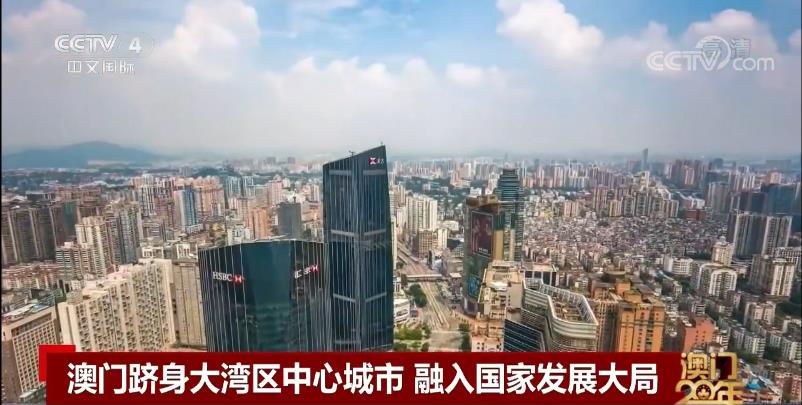
The "Planning Outline" points out the direction for Macao’s development, and it is necessary to build a world tourism and leisure center, a business cooperation service platform between China and Portuguese-speaking countries, and promote moderate and diversified economic development; Create an exchange and cooperation base with Chinese culture as the mainstream and multicultural coexistence. Han Jing, Bureau of Policy Research and Regional Development of the Macao SAR Government, said that in the construction of "one center, one platform and one base", Macao’s greatest advantage is "one country, two systems".
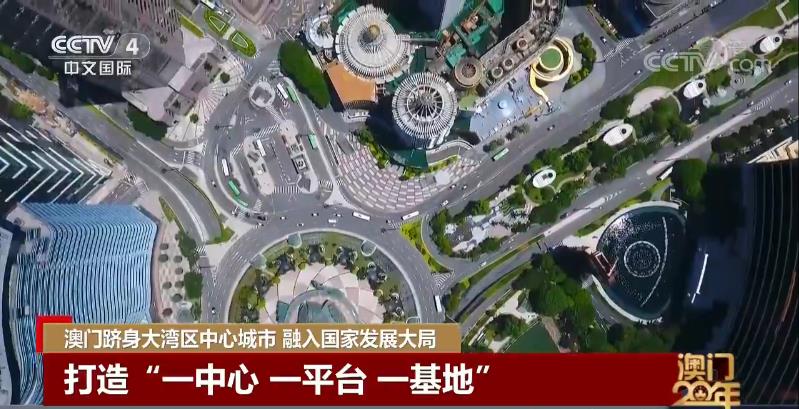
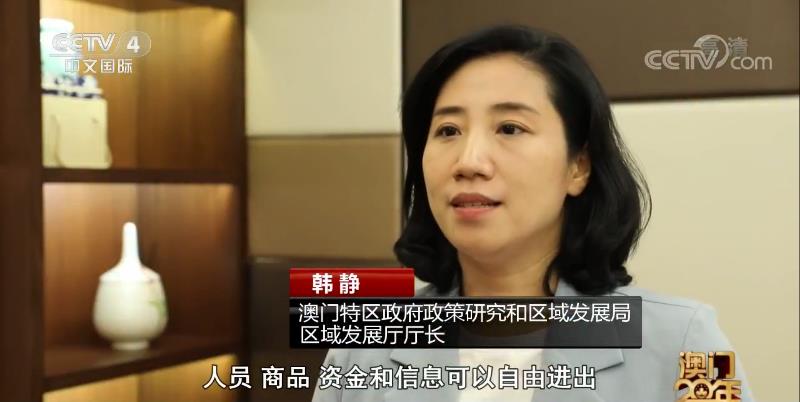
Han Jing, Director of the Regional Development Department of the Policy Research and Regional Development Bureau of the Macao SAR Government:First of all, Macao is an international free port, where people, goods, funds and information can freely enter and exit; Secondly, the operation mode of Macao’s economy is highly in line with international standards. At the same time, Macao has a low tax system, and the tax rate is even lower than that of Hong Kong. Moreover, Macao has an internationally recognized open and safe business environment. These are the irreplaceable advantages of Macao’s integration into Greater Bay Area.
CCTV reporter Zhang Hao:Greater Bay Area has provided a vast market and resources for Macao’s economic development, and Macao can also play its unique role in regional cooperation. The free port of funds with low tax rate gives Macao great potential in the field of investment and financing. Macao’s industrial and commercial circles also saw this, seized the opportunity and took the initiative to connect with Greater Bay Area’s construction.
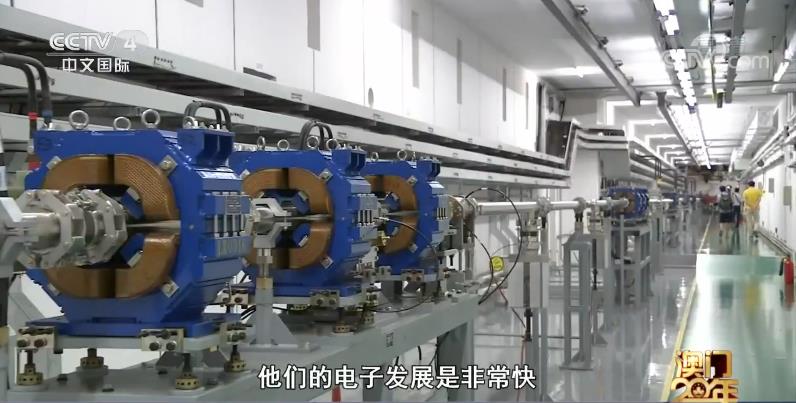
On the 18th, Greater Bay Area Common Home Investment Co., Ltd. was established, which helped Greater Bay Area to form a new pattern of all-round opening-up and Macao’s moderate economic diversification. For young people in Macau, Greater Bay Area has built a platform for them to integrate into the development of the Mainland. Zhong Kezheng, member of the Standing Committee of the Youth Committee of the Chinese General Chamber of Commerce in Macao, believes that the resources in the field of scientific and technological innovation in the Mainland have a unique appeal to Macao talents.
Public Bidding Announcement of Security Outsourcing Service (BSQ25C00036) in 2025-2026
Project overview:
Potential bidders of the "2025-2026 security outsourcing service" project should obtain the procurement documents through "online acquisition" and submit the bidding documents before 10:30 (Beijing time) on May 21st, 2025.
Project number:BSQ25C00036
Project name:Security outsourcing services in 2025-2026
Purchasing method:open tendering
Budget amount:1,917,000.00 yuan
Maximum price: 1,917,000.00 yuan.
Procurement requirements:
Term of performance of the contract:See the procurement documents for details.
Whether the project accepts the consortium:no
II. Qualification requirements of the applicant
1. Meet the provisions of Article 22 of the Government Procurement Law of People’s Republic of China (PRC).
2, the implementation of government procurement policy to meet the qualification requirements:
(a) to meet the provisions of article twenty-second of the People’s Republic of China (PRC) Municipal Government Procurement Law;
(two) the implementation of government procurement policies to meet the qualification requirements:
This project is specially designed for small and medium-sized enterprises, and the bidder shall provide services such as "Statement Letter for Small and Medium-sized Enterprises" or "Certificate Document for Prison Enterprises" or "Statement Letter for Welfare Units for Disabled Persons".
)。
3. Specific qualification requirements of this project:
The bidder shall have a Security Service Permit within the validity period. (Provide a copy of the certificate and affix the official seal of the bidder).
III. Location, method, time limit and selling price of obtaining public bidding documents
Time limit for obtaining documents: April 28, 2025 to May 8, 2025.
Every morning from 09:00:00 to 12:00:00 and from 14:00:00 to 18:00:00. (Beijing time, except legal holidays)
Document purchase fee: 0.00 yuan/package
Where to get the file: online.
Mode or matter:
(a) the bidder shall be registered as a supplier of Chongqing municipal government procurement through Chongqing municipal government procurement network (www.ccgp-chongqing.gov.cn).
(2) Any bidder who intends to participate in the bidding, please go to Chongqing Municipal Government Procurement Website → Personal Center → Online Bid Evaluation → Online Acquisition of Electronic Bidding Documents to download or obtain the bidding documents of this project and all the project materials published before the bid opening (paper bidding documents are not provided in this bidding). Whether the bidder downloads or obtains them or not, it is deemed that all the bidding contents are known.
(3) The tender documents attached to the tender announcement are for reading only, and the supplier is deemed to have legally obtained the tender documents only after logging in to the "Chongqing Government Procurement Network" to complete the online registration application and the registration is approved, otherwise its bid will be rejected.
Note: Bidders who participate in electronic bidding for the first time must apply for CA digital certificate and download the bidding document production system.
1. Handling of CA digital certificate: Suppliers who participate in the electronic bidding project of Chongqing government procurement network for the first time should handle CA digital certificate (please go to the related downloads of "Online Bid Opening" → "Electronic Bidding Center" for the handling process, and download the CA handling manual. )
2. Preparation of bidding documents: Suppliers who participate in the electronic bidding project of Chongqing government procurement network for the first time should log in to Chongqing government procurement network. Enter "Online Bid Evaluation" → "Electronic Bidding Center" to download the bidding document production system.
IV. Submission of Bidding Documents
Time for submission of bid documents: 10:30 on May 20, 2025.
Deadline for submission of bid documents: 10:30 on May 21st, 2025.
Submission place of bidding documents: this project is submitted online. Bidders use the client-side bidding tools provided by the platform to prepare bidding documents before the bidding deadline, and then log in to the "Chongqing Municipal Government Procurement Network" to enter the "Online Bid Opening" column and submit them in the "My Bidding Project → Online Bidding" section.
V. Bid Opening Information
Time for bid opening: May 21, 2025 at 10:30.
Place of bid opening: This project adopts the online bid opening method, and the bidder can remotely participate in the bid opening (necessary equipment for bid opening: CA certificate, laptop with wireless Internet access (camera, microphone and sound card are required), wireless network card, etc.) in Chongqing Municipal Government Procurement Website →→→→→→ Personal Center →→→ Online Bid Evaluation Hall, but the bidder fails to decrypt the electronic bid documents or participate in the bid opening within the specified time due to his own reasons.
Sixth, the announcement period
5 working days from the date of this announcement.
VII. Other Supplementary Matters
1. If the bidder fails to decrypt the electronic bidding documents within the specified time (the default time is 30 minutes, which can be extended/changed according to the on-site response):
(1) If the decryption time is affected by the objective reasons of the whole electronic system of government procurement, the purchaser/procurement agency may extend the decryption time according to the actual situation on site. If the bidder still can’t decrypt it, the bidder can apply to the purchaser/procurement agency to enable the method of uploading unencrypted electronic backup files as a remedial measure; If the bidder neither decrypts nor provides the unencrypted electronic backup file as a remedial measure within the specified time, it shall be deemed that the bidder voluntarily gives up the bidding qualification for the project.
(2) If the decryption work is not completed due to the bidder’s subjective reasons, and the effective unencrypted backup file is not provided within the specified time, it will be deemed that the bidder cancels the bid document after the deadline for submitting the bid document, and the response is invalid, and the bidder shall not participate in the subsequent procurement activities of this project. If the project provides a deposit, the deposit deduction will not be refunded.
2. This project adopts the whole process of electronic bidding. All bidders should be familiar with the whole process of electronic bid opening and evaluation of government procurement. For specific e-procurement rules and operation instructions, please download the attachment of the project announcement, Process Manual for Bidders to Deal with Formal CA Signature of Chongqing Whole-process Electronic Bidding Project, Supplier Operation Manual for Whole-process Electronic Procurement System of Government Procurement (CA Certificate Signature Edition) and Software Installation Manual for Suppliers of Government Procurement (CA Edition), and operate according to their requirements.
3. This project specifies the information of the special account for paying the bid bond.
VIII. Contact information
1, the purchaser information
Purchaser: Second People’s Hospital of Bishan District, Chongqing.
Purchasing Agent: Deng Shengqian
Buyer’s Tel: 13983499841
Purchaser’s address: No.238 Huimin Road, Dingjia Street, Bishan District, Chongqing
2. Information of purchasing agency
Agency: Chongqing Bishan District Public Resource Trading Center.
Agent: Miss Li.
Agency Tel: 41660583
Agency address: 3rd floor, Zone A, Administrative Service Center, No.1 Tieshan Road, Biquan Street, Bishan District, Chongqing.
3. Project contact information
Project Contact: Wang Shaoyu
Telephone number of project contact person: 15823188858
IX. Annexes
The content provided on this page is published by the purchaser or procurement agency in accordance with the requirements of relevant laws and regulations on government procurement. Chongqing Municipal Government Procurement Network is not responsible for its content, nor does it assume any legal responsibility.
Ministry of Education: In 2023, the Normal University under the Ministry of Education plans to recruit 8,300 normal students at public expense.
Cctv newsAccording to the Ministry of Education and the General Secretary of the Supreme Leader, it is necessary to take strengthening the construction of teachers as the most important basic work in building an educational power. This year is the 39th Teachers’ Day and the first Teachers’ Day after the 20th National Congress of the Communist Party of China. We thoroughly implement the spirit of the 20th National Congress of the Communist Party of China and the important exposition on education made by General Secretary of the Supreme Leader, and constantly promote the construction of the teaching staff.
First, new achievements have been made in the construction of teachers’ morality and style.
We held a deployment meeting to promote the construction of teachers’ morality and style and start the centralized study and education of teachers’ morality, and implemented six major actions such as "casting souls with thoughts" in political construction. In the national public service platform of wisdom education, 96 courses of teachers’ morality were built, and four seminars on national conditions education for young teachers in colleges and universities and demonstration seminars on teachers’ morality and ethics education for leaders and key teachers in primary and secondary schools were held. Implement the system of employment prohibition and access inquiry, and strengthen the bottom line constraint of teachers’ morality. Highlight the typical guidance and carry forward the social fashion of respecting teachers and attaching importance to teaching. In 2023, together with Publicity Department of the Communist Party of China, we will select trees to promote one model of the times, 12 national models of teaching and educating people, 10 most beautiful teachers, one special tribute figure and one most beautiful teacher team. Announced 1998 national teaching achievement awards, including 570 basic education awards; 572 vocational education and higher education (undergraduate); 284 higher education (graduate students).
Second, the characteristic teacher education system in China has formed a new situation.
Initiate the implementation of the national excellent primary and secondary school teachers training plan ("National Excellent Plan"). Support the "double-first-class" construction of colleges and universities to train excellent teachers at the graduate level for primary and secondary schools. The first batch of pilot projects supported Peking University, Tsinghua University, Fudan University, Shanghai Jiaotong University and other six subordinate normal universities, and a total of 30 "double-first-class" construction colleges and universities undertook the training task. Promote public education for normal students.In 2023, the Normal University under the Ministry plans to recruit 8,300 normal students at public expense. It is planned to recruit 12,420 normal students for the "Excellent Teacher Program", an increase of 28% compared with the beginning of its implementation in 2021.Promote the implementation of the collaborative quality improvement plan for normal education. More than 600 cadres and teachers were exchanged in 72 normal universities, nearly 900 normal students visited and exchanged, trained across schools, trained 203,000 teachers, opened 862 high-quality courses, and shared nearly 800 library resources and databases.
Third, new progress has been made in teacher management reform and treatment guarantee.
Deepen the reform of teacher management. Select 10 regions at the provincial, city and county levels to carry out the pilot reform of the national basic education teachers’ team, and encourage and support local governments to explore new ideas and new measures to deepen the reform of the basic education teachers’ team.We will further promote the reform of the teacher qualification system and smoothly organize the qualification examination and accreditation of primary and secondary school teachers. In the first half of 2023, 4.273 million people applied for the teacher qualification examination.. Increase the recruitment and training of postdoctoral students and optimize the reserve of young talents. Deepen the reform of teachers’ professional title system, implement the evaluation and supervision of professional titles in colleges and universities, and broaden the channels for teachers’ professional development. Continue to strengthen the protection of teachers’ treatment. Improve the linkage mechanism of compulsory education teachers’ salary adjustment with local civil servants’ salary adjustment. In conjunction with the Ministry of Human Resources and Social Security, the Ministry of Finance and other departments, we will continue to consolidate the results that the average wage income of compulsory education teachers is not lower than that of local civil servants.
Fourth, new breakthroughs have been made in the construction of "double-qualified" teachers in vocational education.
Improve the policy of part-time teachers in vocational schools. In conjunction with the Ministry of Finance, the Ministry of Human Resources and Social Security, and the State-owned Assets Supervision and Administration Commission of the State Council, the Measures for the Administration of Part-time Teachers in Vocational Schools were revised to encourage attracting technical and skilled personnel to teach part-time in vocational schools. Improve the standard system of vocational education teachers in the new era. The standards for the identification of "double-qualified" teachers in vocational education were issued, and the connotation requirements, identification scope and identification process of "double-qualified" teachers were clarified and standardized at the national level for the first time. Optimize the training system of vocational education teachers. Promote high-level universities, head enterprises and vocational colleges to form a community, and build 170 "double-qualified" teacher training bases by hierarchical classification. We continued to implement the quality improvement plan for teachers in vocational colleges, and completed 136,000 national trainings and 92,000 provincial trainings. Implement the "National Training of Vocational Education" demonstration project.
Fifth, the allocation of teachers’ resources presents a new look.
The scale of teachers has been further expanded and their quality has been further improved. By the end of 2022, there were 359,800 full-time teachers at all levels in China, an increase of 1.95%. The proportion of full-time teachers with bachelor degree or above in compulsory education in China was 81.02%, up by 3.3 percentage points over the previous year. Among them, the proportion of full-time teachers with bachelor degree or above in rural compulsory education was 76.01%, up by 3.78 percentage points over the previous year. The proportion of full-time teachers with senior titles in compulsory education is 54.39%, that in ordinary high schools is 60.78%, that in secondary vocational schools is 58.99%, and that in higher education is 42.22%. Respond to the changing trend of population and promote the optimal allocation of teacher resources. Deploy and carry out the demand mapping and development prediction of kindergarten teachers in primary and secondary schools, carry out special research, conduct comprehensive research and forward-looking layout. In conjunction with the Ministry of Finance, we will continue to implement the "Special Post Plan" in depth. In 2023, we plan to recruit 52,300 people and continue to supplement high-quality teachers for rural schools.
The theme of this year’s Teacher’s Day is: I am a strong country in the field of teaching.
The Ministry of Education has issued a notice to make arrangements for the publicity and celebration of the 39th Teacher’s Day, demanding that all activities of Teacher’s Day be carried out ceremoniously, enthusiastically and efficiently. This year, we will hold a national symposium for outstanding teachers, carry out the publicity activities of "model of the times", national model of teaching and educating people, the selection of the most beautiful teachers, the roving report activities of national outstanding special post teachers, the activities of "lighting up the city" to pay tribute to teachers, the learning and publicity activities of outstanding young teachers in rural areas, the micro-video exhibition and broadcast activities of "short videos of teachers’ elegant demeanor and touching moments", the teachers’ visit and condolence activities, and jointly organize the fourth national teaching competition for young teachers in primary and secondary schools with the All-China Federation of Trade Unions. A series of activities, such as teacher-themed movies and TV plays, will create a good atmosphere for the whole party and society to respect teachers and attach importance to teaching, and encourage teachers and educators to actively participate in the practice of building a strong country through education.
Happy birthday, little prince.
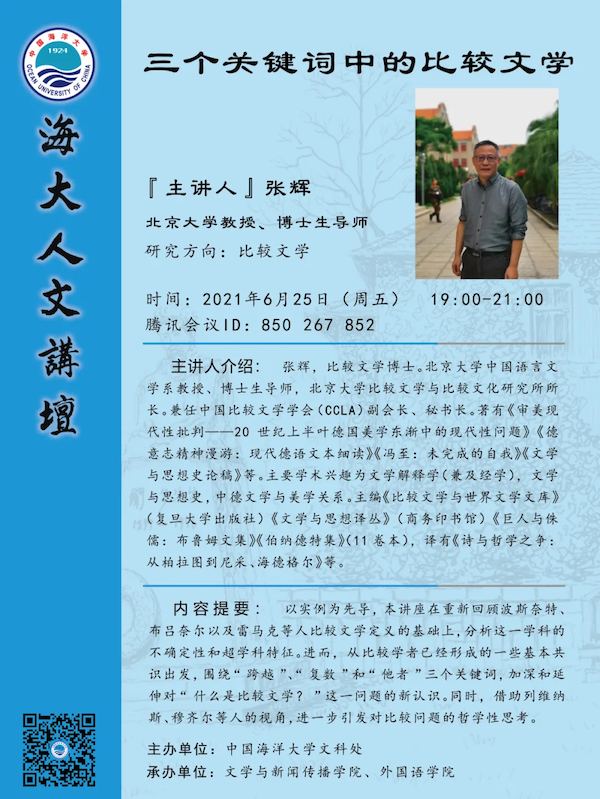
Comparative literature in three key words
Time:June 25th (Friday) 19:00-21:00.
Location:Tencent conference (ID: 850267852)
Speaker:Zhang Hui (Professor and Doctoral Supervisor, Chinese Department, Peking University)
Taking examples as the guide, this lecture reviews the definitions of comparative literature by Bosnett, Brunel and remarque, and analyzes the uncertainty and interdisciplinary characteristics of this subject. Furthermore, starting from some basic consensus that comparative scholars have formed, this paper deepens and extends the new understanding of "what is comparative literature" around three key words: "leap", "plural" and "the other". At the same time, with the help of the perspectives of Levinas, Muzil and others, the philosophical thinking on comparative problems is further triggered.
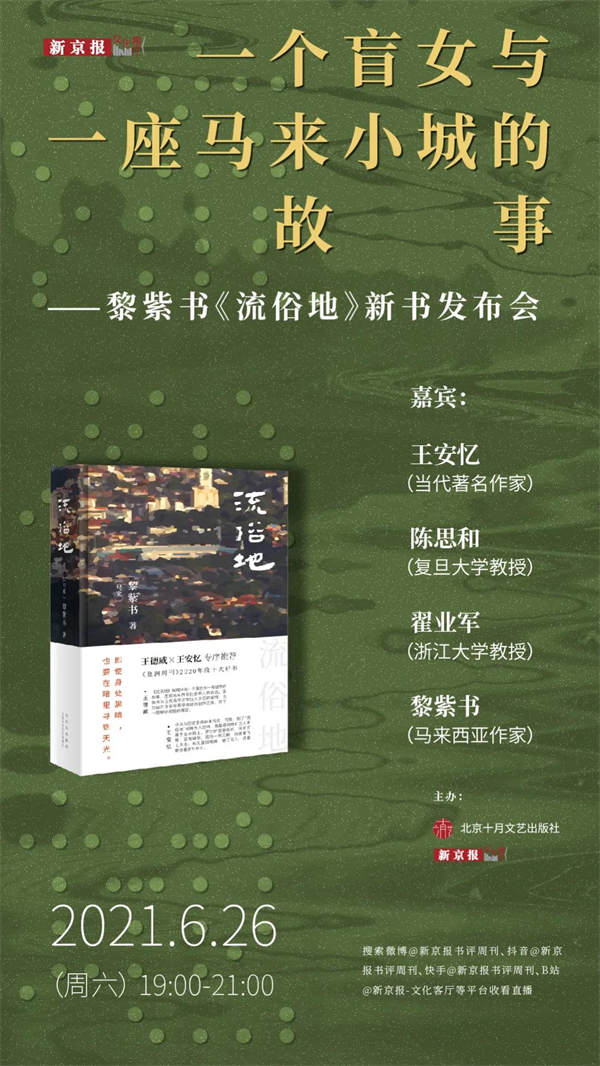
The story of a blind girl and a small town in Malay —— A new book sharing meeting of Li Zishu’s Land of Vulgarity
Time:19:00 on June 26th (Saturday)
Location:Hey, Beijing News APP, Weibo, Aauto Quicker, Tik Tok, etc.
Guest:Wang Anyi (writer), Chen Sihe (senior professor of liberal arts and doctoral supervisor of Fudan University), Zhai Yejun (professor of Chinese Department of Zhejiang University) and Li Zishu (writer).
In recent years, Malaysian Chinese literature (referred to as "Malaysian Chinese literature") has gradually entered our field of vision. Li Zishu, the protagonist of this activity and the author of "Vulgar Land", turned the big problem into an obscure obsession from the trivial daily life of dressing and eating through grotesque, delicate and realistic stories from her female perspective. On June 26th, Chen Sihe, a professor at Fudan University, Zhai Yejun, a professor at Zhejiang University, and Li Zishu, a Malaysian writer and author of "Land of Vulgarity", were invited by the Beijing News Book Review Weekly and Cultural Living Room in conjunction with Beijing October Literature and Art Publishing House to talk about Malaysian literature and a story about a blind girl and a small Malay town …
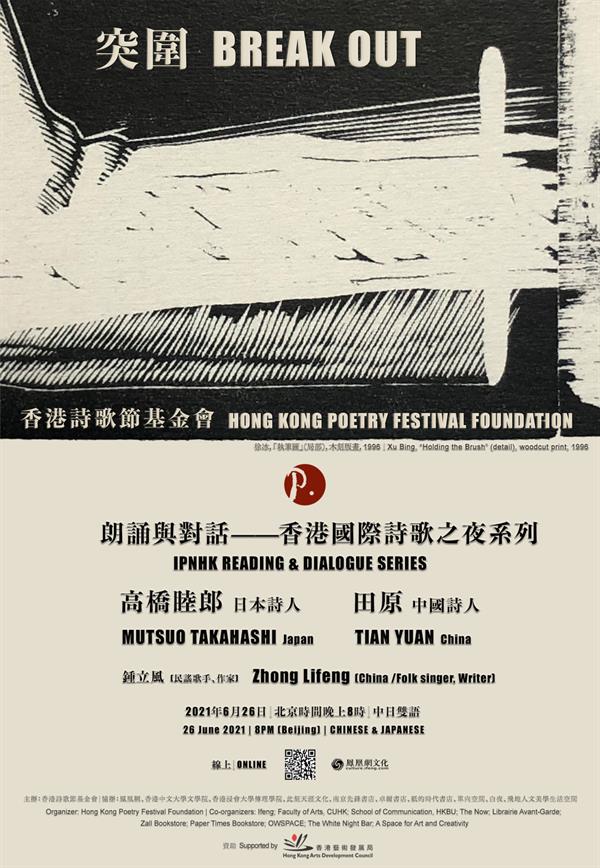
Breakthrough: Recitation and Dialogue Scene 4-International Poetry Nights in Hong Kong Series
Time:20:00 on June 26th (Saturday)
Location:Phoenix net
Guest:Gao Qiao Mu Lang (poet) and Tian Yuan (poet)
Gao Qiao Mulang, born on December 15th, 1937, is one of the most outstanding and prolific male poets, essayists and writers in contemporary Japan. He has more than 30 books of poetry, several prose works, dozens of prose monographs and several important literary awards. In the fourth scene of International Poetry Nights in Hong Kong series, we invited Gao Qiao Mulang to talk with China poet Tian Yuan, and invited musician Zhong Lifeng as the guest performer.
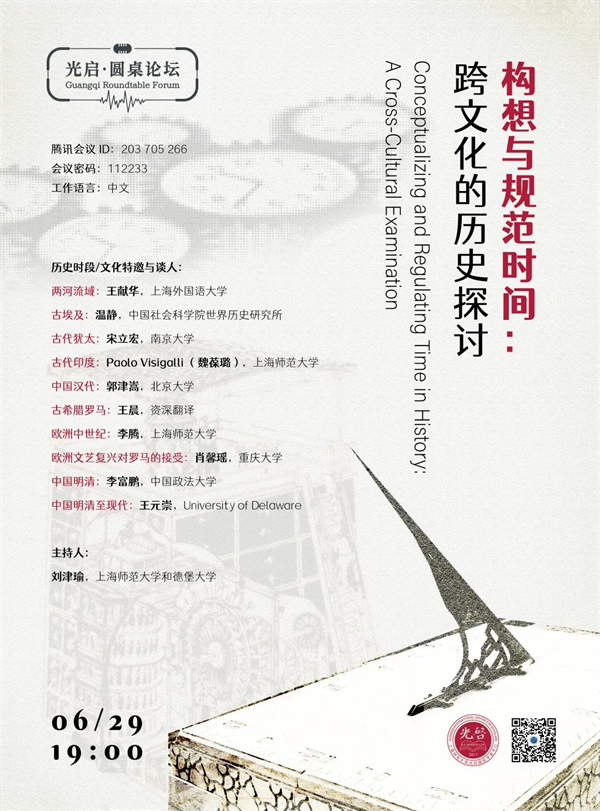
Conceiving and standardizing time: a cross-cultural historical discussion
Time:19:00 on Tuesday, June 29th.
Location:Tencent conference (ID: 203705266, password: 112233)
Guest:Guo Jinsong (postdoctoral fellow, Department of History, Peking University), Li Fupeng (Associate Professor, School of Law, China University of Political Science and Law), Liu Jinyu (Professor, Department of World History, Shanghai Normal University, Professor, Department of Classics, Depot University, USA), Wang Xianhua (Professor, Doctoral Supervisor, Shanghai International Studies University), Wang Yuanchong (Associate Professor, Department of History, University of Delaware, USA), etc.
What are the ways and paths to regulate time in history? Is there any essential difference between the time under the framework of empire and the time of polis? What historical enlightenment can we get from comparing the societies in different time frames? How do the ways of constructing and regulating time between different cultures influence each other? Is there any difference or change in individual’s cognition of time due to different social, economic and political status? This round-table forum adopts the perspective of seeing the big from the small, and takes dialogue as the main form, expecting the knowledge collision between researchers from two river basins, ancient Egypt, ancient India, Judaism, ancient Greece and Rome, the Middle Ages, China and other different cultures or different historical periods.
Attachment: Preview of offline activities
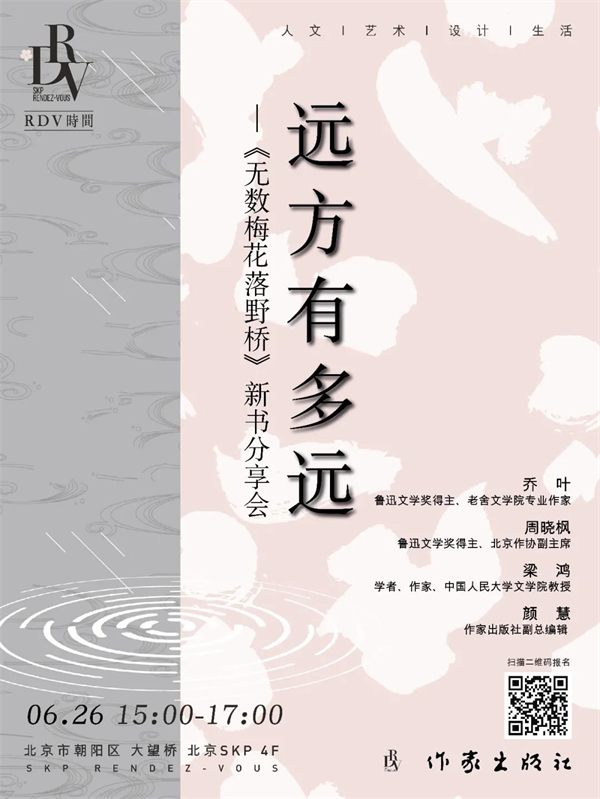
Beijing | How Far Is It? —— A New Book Sharing Meeting of Countless Plum Blossoms Falling on the Wild Bridge
Time:June 26th (Saturday) 15:00-17:00.
Location:SKP RENDEZ-VOUS, 4th floor, Beijing SKP Shopping Center, No.87 Jianguo Road, Chaoyang District
Guest:Qiao Ye (writer), Zhou Xiaofeng (writer), Liang Hong (scholar, writer, professor of China Renmin University) and Yan Hui (deputy editor-in-chief of Writers Publishing House).
Countless Plum Blossoms Falling on the Wild Bridge is the first collection of beautiful travel essays by Qiao Ye, a famous writer, and many of them have been selected for senior high school Chinese reading analysis and senior high school Chinese examination papers. How far is it? It can be in the sky or in front of you. Fortunately, in the days when the mind can’t soar, there are still good books that can put wings on us. Let travel become a habit, and let all journeys be accompanied by beautiful scenery. On June 26th, we invited writer Zhou Xiaofeng, scholar and writer Liang Hong, Yan Hui, deputy editor-in-chief of Writers Publishing House, and Qiao Ye, the author of "Numerous Plum Blossoms Fall on the Wild Bridge", to visit SKP in Beijing to talk about the distant and immediate scenery.
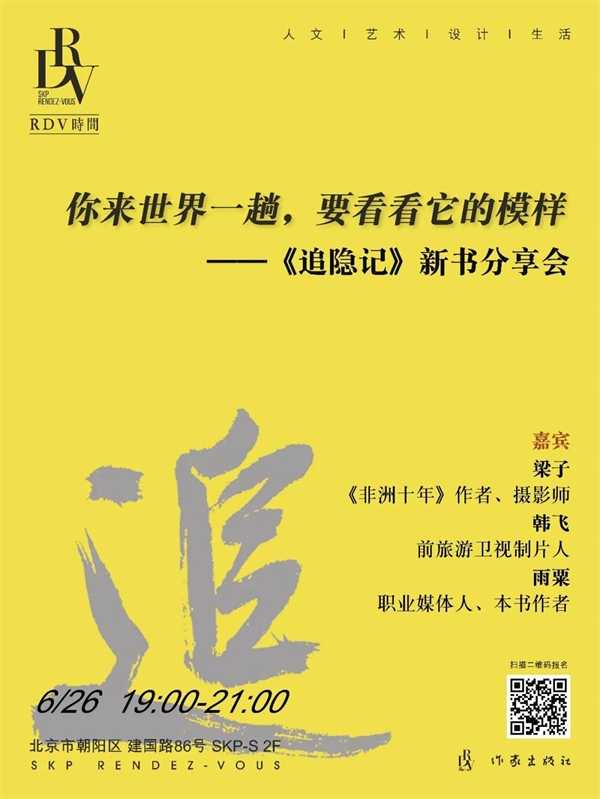
Beijing | When you come to the world, you should see what it looks like —— A new book sharing session of "Chasing the Hidden"
Time:June 26th (Saturday) 19:00-21:00
Location:SKP RENDEZ-VOUS, Floor 2, Beijing SKP-S Shopping Center, No.86 Jianguo Road, Chaoyang District
Guest:Liang Zi (photographer), Han Fei (former travel channel producer), Yu Su (media person)
In 2021, when the epidemic is still raging, have you been away for a long time to see what the world looks like? On June 26th, we invited Liang Zi, the author of Africa Decade, a photographer, Han Fei, a former travel channel producer, and Yu Su, a professional media person and the author of Chasing the Hidden Story, to visit SKP-S and talk about the distant place where our hearts are.
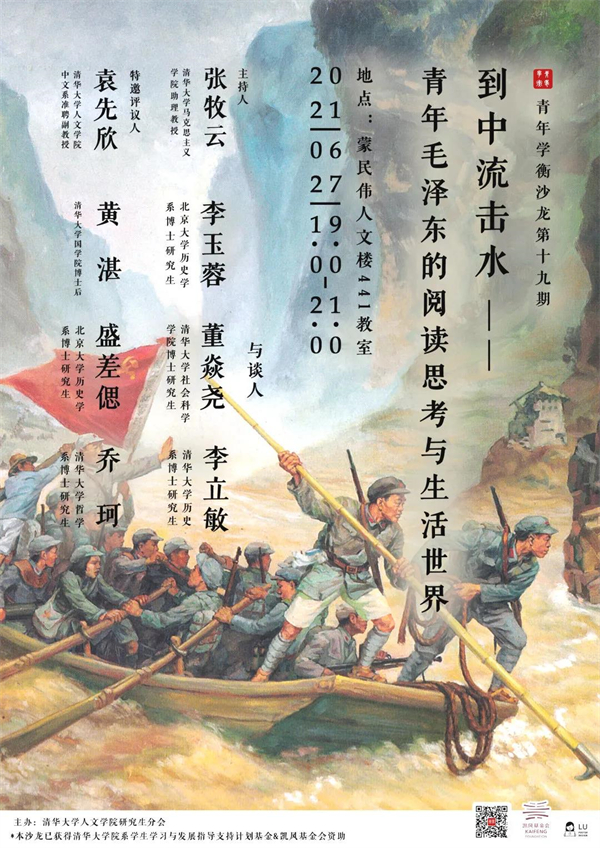
Beijing | hitting the water in the middle stream —— Young Mao Zedong’s reading thinking and life world
Time:June 27th (Sunday) 19:00-21:00.
Location:Room 441, Mengminwei Humanities Building, Tsinghua University, No.30 Shuangqing Road, Haidian District
Guest:Yuan Xianxin (Associate Professor of Chinese Department of Tsinghua University College of Humanities), Li Yurong (Ph.D. student of Peking University Department of History), Dong Yanyan (Ph.D. student of political science of Tsinghua University College of Social Sciences), etc.
In the early 20th century, China forged its youth era in the drastic social transformation. As a cultural symbol, "youth" not only symbolizes the most dynamic ideological form in the new world, but also reflects the national mentality of seeking change and striving for survival; At the same time, it is a thorough revaluation of all cultural values. The discussion in this salon focuses on the graduate students who are both in their youth. In the resonance of historical feelings, we will try to understand and think about the ideological change and revolutionary motivation of young Mao Zedong in combination with specific regional culture and characteristics of the times, so as to add a vivid and profound thinking material for us to understand the internal logic of modern history of China.
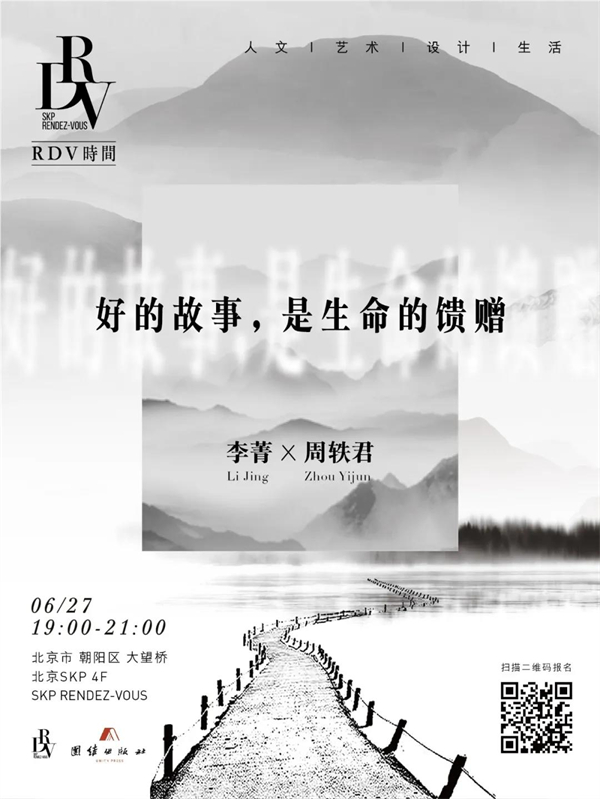
Beijing | A good story is a gift of life.
Time:June 27th (Sunday) 19:00-21:00.
Location:SKP RENDEZ-VOUS, 4th floor, Beijing SKP Shopping Center, No.87 Jianguo Road, Chaoyang District
Guest:Jing Li (deputy editor-in-chief of Sanlian Life Weekly) and Zhou Yijun (reporter and director)
On June 27th, Li Jing, deputy editor-in-chief of Sanlian Life Weekly, with a good story, and Zhou Yijun, a famous journalist and director, were in SKP, Beijing, to talk with you about books and hearts. Of course, in addition to the stories in the book, you also have the opportunity to hear the stories of the two guests themselves-about career, about family, about walking and about life. What is an excellent modern independent female benchmark? Maybe they are the answer.
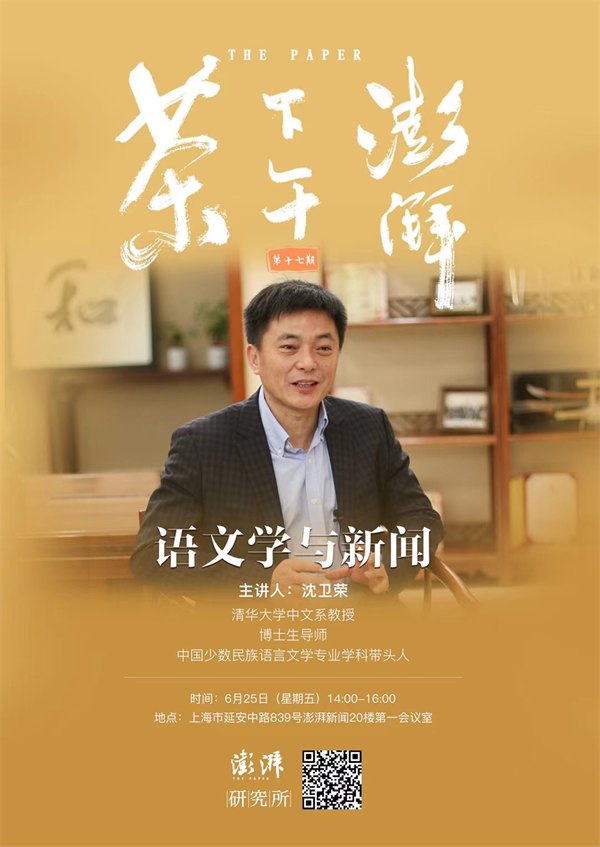
Shanghai | Literature and News
Time:June 25th (Friday) from 14: 00 to 16: 00.
Location:The first meeting room on the 20th floor of The Paper, No.839 Yan ‘an Middle Road, Jing ‘an District.
Speaker:Shen Weirong (Professor and Doctoral Supervisor, Chinese Department, Tsinghua University)
In the afternoon tea, Professor Shen Weirong from Tsinghua University was invited to give a lecture on Chinese literature and news.
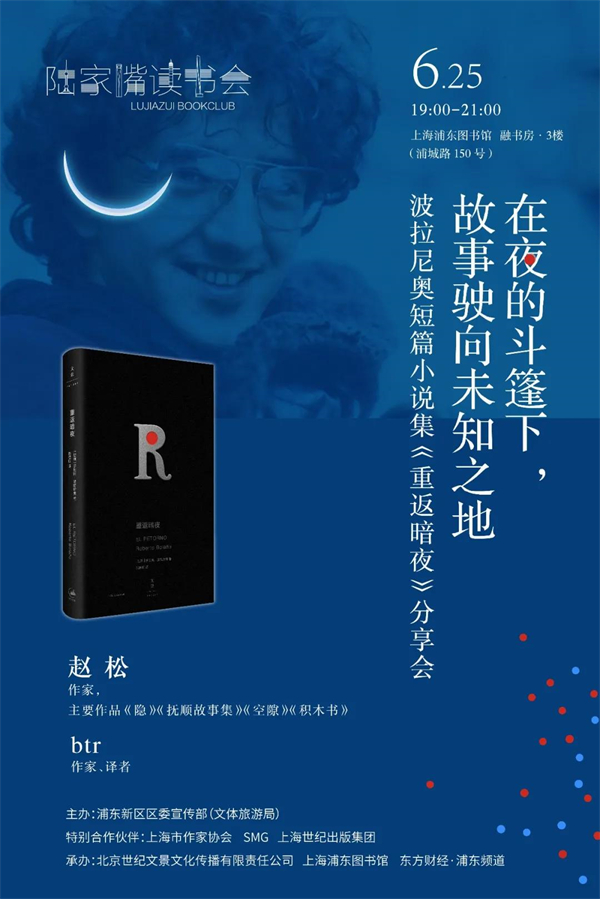
Shanghai | Under the cloak of night, the story sails to an unknown place —— Sharing meeting of Bola? o’s collection of short stories "Return to the Night"
Time:June 25th (Friday) 19:00-21:00.
Location:3/F, No.150 Pucheng Road, Pudong New Area, Shanghai Pudong Library Rong Study Room
Guest:Zhao Song (writer), btr (writer, translator, cultural critic)
In the collection of short stories "Back to the Dark Night", the characters in Bola? o’s novels still retain the background color of wanderers, but their identities and appearances have become more diverse. On Friday night, writer Zhao Song and writer and translator btr will visit Lujiazui Reading Club, starting from Return to Night, and take everyone to explore Bola? o’s literary universe.

Shanghai | If you don’t come, it’s going to snow —— Sharing Meeting of Mr. Mu Xin’s Chronicles
Time:June 25th (Friday) 19:00-21:00.
Location:Sinan Bookstore, No.517 Fuxing Middle Road, Huangpu District
Speaker:Xia Chunjin (scholar, reading promoter)
On the evening of June 25th, Xia Chunjin, the author of Mr. Mu Xin’s Chronicles, will be a guest at Sinan Bookstore, taking you to read this masterpiece of Mu Xin’s research, which has accumulated for eight years, and taking readers back to Mu Xin’s life.
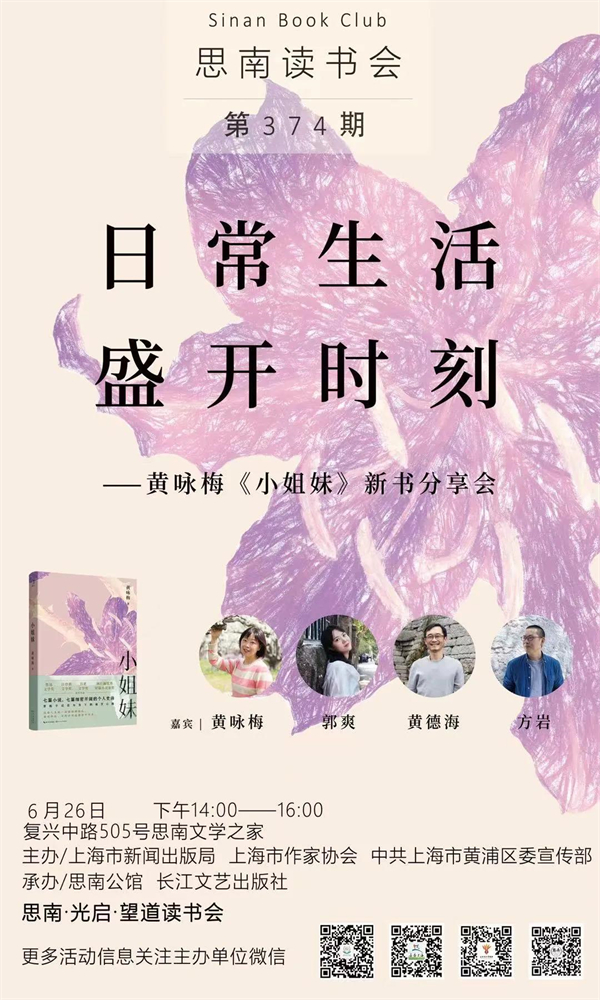
Shanghai | The Blooming Moment of Daily Life —— A New Book Sharing Meeting of Little Sisters by Huang Yongmei
Time:June 26th (Saturday) 14:00-16:00.
Location:Sinan Literature House, No.505 Fuxing Middle Road, Huangpu District
Guest:Huang Yongmei (novelist), Guo Shuang (writer), Huang Dehai (deputy editor-in-chief of Sinan Literature) and Fang Yan (deputy editor-in-chief of Sinan Literature)
Daily hardships and difficulties, inner distance and longing often constitute a double-line narrative in Huang Yongmei’s novels, which makes her daily life look vast and Shu Lang, like a fierce and enthusiastic aunt, a persistent and sensitive female writer, a wandering and tenacious father … It is difficult for us to fix a face for Huang Yongmei’s stories. We can only say that this is life itself. In the 21st-century literary novels, in which gender is gradually abandoned, and under the tide of Internet culture, mature female writers represented by Huang Yongmei are trying to go deep into the vast spiritual world in the new century and hold up a changeable and determined world. On the afternoon of June 26th, Huang Yongmei will take her latest anthology of novels, Little Sisters, and discuss those blooming moments of daily life with writer Guo Shuang, critics Huang Dehai and Fang Yan.
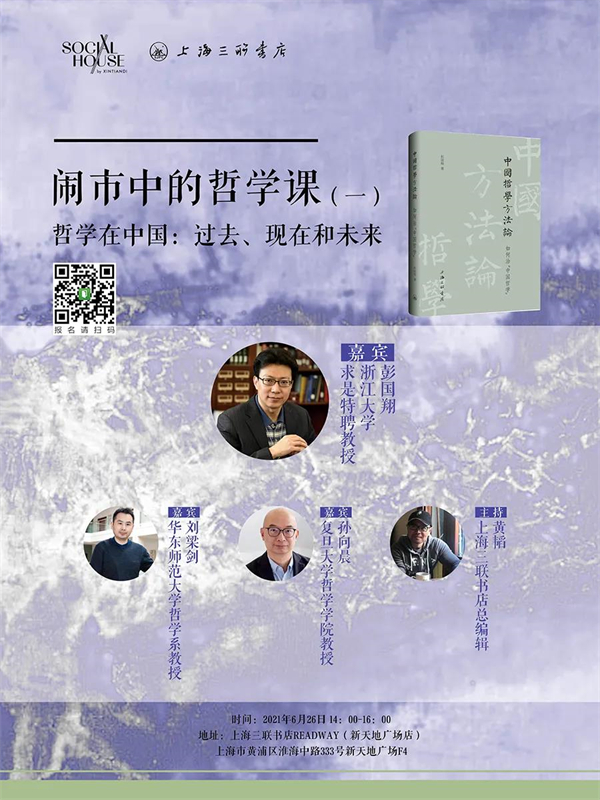
Philosophy Course in Shanghai | Downtown (I) —— Philosophy in China: Past, Present and Future
Time:June 26th (Saturday) 14:00-16:00.
Location:No.333 Huaihai Road, Huangpu District Xintiandi F4 Shanghai Sanlian Bookstore READWAY
Guest:Peng Guoxiang (seeking truth from distinguished professor, Zhejiang University), Sun Xiangchen (Dean and Professor, School of Philosophy, Fudan University) and Liu Liangjian (Dean and Professor, Department of Philosophy, East China Normal University).
Philosophy begins with curiosity, and everyone is a philosopher when looking up at the stars; Philosophy grew up in the city, and Socrates laid the foundation of philosophy in the noisy market of Athens. Philosophy is around us, and everyone has their own understanding of the world more or less. Even in this bustling downtown, we know that you care about more than the immediate prosperity. On the afternoon of June 26th, the first lecture of a series of lectures on "Philosophy in the Downtown" was given by Peng Guoxiang, a teacher from Qiushi distinguished professor, Zhejiang University. Not long ago, he just published a masterpiece "Methodology of China Philosophy: How to Treat" China Philosophy "; The two guests were Professor Sun Xiangchen, Dean of the School of Philosophy of Fudan University, and Professor Liu Liangjian from the Department of Philosophy of East China Normal University. The theme will revolve around the proposition "China’s Philosophy".
Shanghai | The Integration of Shanghai Culture and Jiangnan Culture
Time:14:00 on June 26th (Saturday)
Location:Academic lecture hall on the third floor of Putuo District Library, No.1800 Daduhe Road, Putuo District
Speaker:Cherish Jane (writer)
Cities have temperatures, blocks are suitable for walking, and buildings can be read. When we walk around the block and read the buildings, we can feel the foreign-style Shanghai in people’s eyes everywhere. In fact, it is also full of strong Jiangnan customs, which are covered by the buildings themselves and endowed by people living in them. This is unique to Shanghai, which is full of rivers and rivers, and is also created by Shanghai’s urban spirit. In this lecture, Shanghai writer Xi Zhen talks with you about the integration of Shanghai culture and Jiangnan culture.
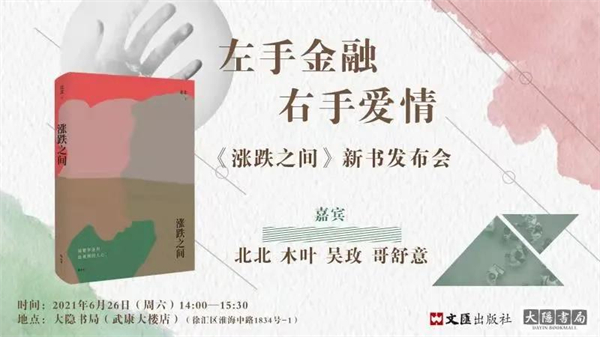
Shanghai | Left-handed Finance, Right-handed Love —— The Press Conference of the New Book Between Rise and Fall
Time:June 26th (Saturday) 14:00-15:30.
Location:No.1834 Huaihai Middle Road, Xuhui District -1 Dayin Bookstore
Guest:Bei Bei (college teacher), Mu Ye (literary critic and poet), Wu Mei (editor-in-chief of Shanghai Education Press) and Ge Shuyi (novelist)
From the perspective of Shanghai World Financial Center, Beibei’s Between Ups and Downs depicts the bitter ups and downs in the financial market. On June 26th, we will hold "Left-handed Finance, Right-handed Love —— Between the Ups and Downs" in Wu Kang Road Store of Da Yin Bookstore to discuss the new form of social life under the financial wave.
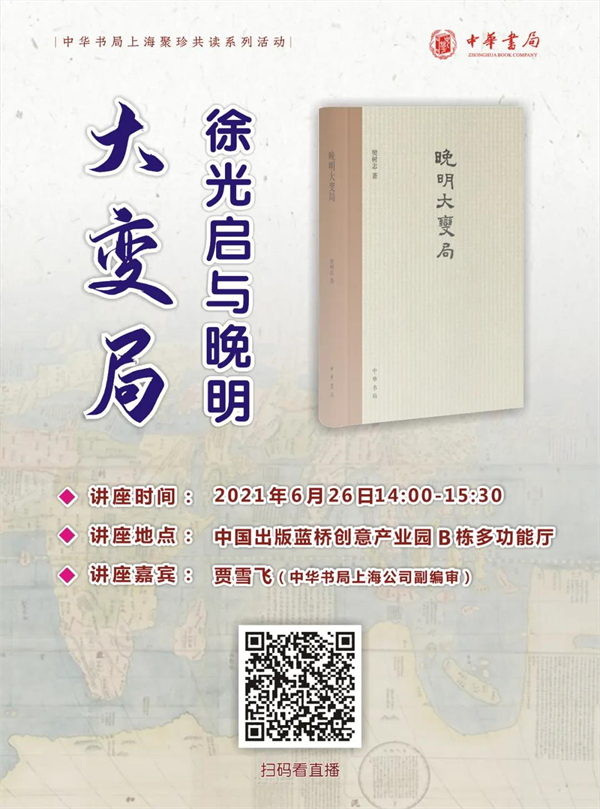
Shanghai | Xu Guangqi and the Great Changes in the Late Ming Dynasty
Time:June 26th (Saturday) 14:00-15:30.
Location:Multi-function Hall, Building B, China Publishing Lanqiao Creative Industrial Park, No.838 Guangji Road, Hongkou District
Speaker:Jia Xuefei (Deputy General Manager, Shanghai Juzhen Company, Zhonghua Book Company)
As a scholar who grew up in the traditional society of China, Xu Guangqi paid attention to the practice of solving people’s livelihood problems in the process of taking the imperial examination, treated the emerging western science and technology with an open mind and a pragmatic attitude, and tried to integrate it into Chinese culture for our use. The late Ming Dynasty experienced the first step of China’s integration into the world, which prompted a great change in the late Ming Dynasty, and Xu Guangqi was one of the representatives who promoted this change.
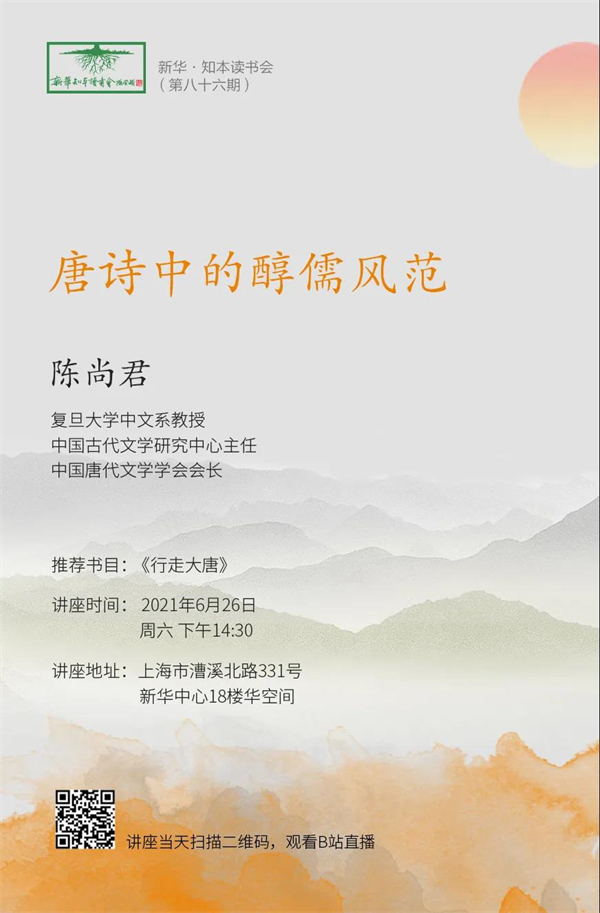
The Pure Confucian Style in Shanghai | Tang Poetry
Time:14:30 on June 26th (Saturday)
Location:China Space, 18th Floor, Xinhua Center, No.331 Caoxi North Road, Xuhui District
Speaker:Chen Shangjun (Professor, Chinese Department, Fudan University)
Professor Chen Shangjun specializes in literature and classical philology of Tang and Song Dynasties. He has devoted much effort to the collection and textual research of literature in Tang Dynasty and the study of writers’ lives and works in Tang and Song Dynasties. He is also engaged in the study of historical philology and stone carving philology. This Xinhua Zhiben Reading Club invited Mr. Chen Shangjun to give a lecture on the mellow Confucian style in Tang poetry.
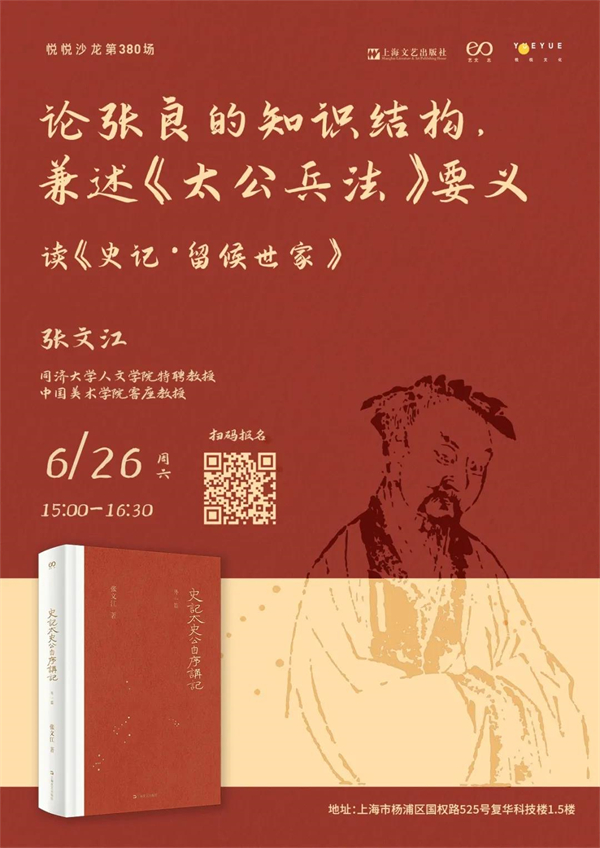
Shanghai | On Zhang Liang’s Knowledge Structure and the Essentials of Taigong’s Art of War —— Reading Historical Records: A Family Leaving Hou’s Family
Time:June 26th (Saturday) 15:00-16:30.
Location:Zhida Bookstore, Floor 1.5, Fuhua Science and Technology Building, No.525 Guoquan Road, Yangpu District, Activity Space
Speaker:Zhang Wenjiang (School of Humanities, Tongji University, distinguished professor)
In this lecture, Professor Zhang Wenjiang, a guest, will discuss the knowledge structure of Zhang Liang, the first hero of the Western Han Dynasty, and discuss the spread and essence of The Art of War, so as to understand what my father taught me.
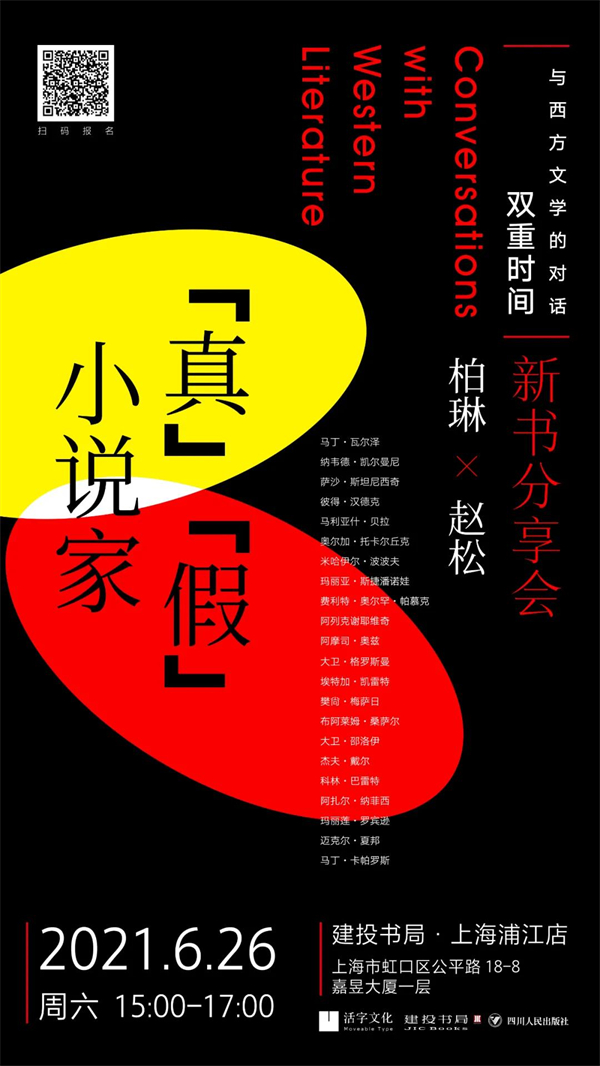
Shanghai | "True" and "False" Novelists —— Sharing Meeting of Double Time: Dialogue with Western Literature
Time:June 26th (Saturday) 15:00-17:00.
Location:4F Biography Library of Investment Press was built on the first floor of Jiayu Building, Building 8, No.18 Gongping Road, Hongkou District.
Guest:Bai Lin (cultural journalist and writer) and Zhao Song (writer)
In "Double Time", Berlin asks questions to dozens of writers who are well-known in the contemporary literary world, but not only talks about literature with them, but also often "wanders into social issues and moral issues". She not only pays attention to the writers’ status as "writers", but also presents readers with their diverse faces as humanists, investigative journalists, critics and even political participants, and their views on the world through these faces. For Zhao Song, the novel itself contains infinite possibilities. In this world, he is an "architect", constantly trying to build a new reality with words; He is also a "chemist", observing the chemical reactions brought about by fresh word combinations. On the afternoon of June 26th, Jiantou Bookstore, in conjunction with movable type culture, invited Bai Lin, who had interviewed many novelists, and Zhao Song, a novelist, to visit Jiantou Bookstore and Shanghai Pujiang Store to have a talk on the topic of "True and False Novelists". The so-called "truth" and "falsehood" are not meant to define "writer", and it is even possible that this dialogue will make this identity more chaotic.
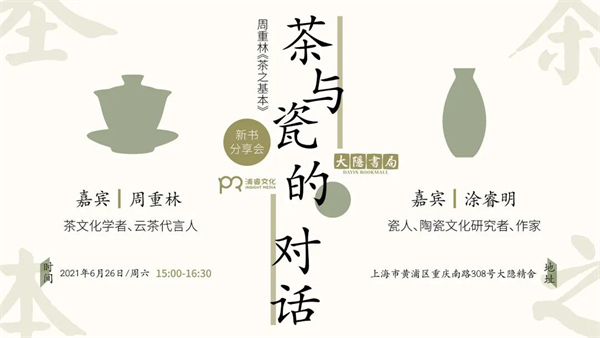
Shanghai | Dialogue between Tea and Porcelain —— Sharing Meeting of the New Book "Fundamentals of Tea"
Time:June 26th (Saturday) 15:00-16:30.
Location:Da Yin Jing She, No.308 Chongqing South Road, Huangpu District
Guest:Zhou Zhonglin (tea culture scholar) and Tu Ruiming (ceramic culture researcher and writer)
As we all know, tea begins with Lu Yu’s Tea Classic. The Book of Tea is the earliest, most complete and comprehensive monograph on tea in the world, and is known as the "encyclopedia of tea". The production of tea utensils is inseparable from ceramics. Tea and porcelain are both the essence of Chinese civilization and China’s great contribution to world material civilization, and they are closely related. On June 26th, Mr. Zhou Zhonglin, a well-known tea culture scholar and spokesperson of Yuncha, and Mr. Tu Ruiming, a well-known porcelain person and ceramic culture researcher, will visit Da Yin Bookstore and bring us their in-depth interpretation of the topic of tea and porcelain.
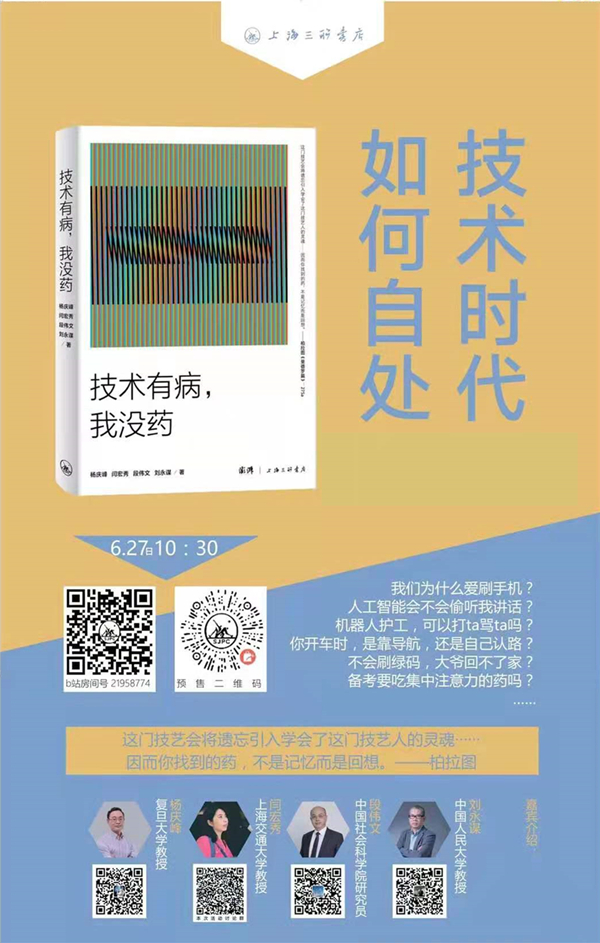
Shanghai | How to deal with yourself in the technological age
Time:10:30 on Sunday, June 27th.
Location:The bookstore 2F at the foot of the mountain, No.58 Foshan Road, Songjiang District.
Guest:Yang Qingfeng (Professor, Research Center for Biomedical Ethics, Fudan University), Yan Hongxiu (Professor, Institute of Science History and Science Culture, Shanghai Jiaotong University), Duan Weiwen (Researcher, Institute of Philosophy, China Academy of Social Sciences) and Liu Yongmou (Professor, School of Philosophy, China Renmin University).
Enjoy the consequences of technology, or give up the convenience of technology, everyone living in modern society, I’m afraid there is no choice-technology, agent of a variety of lifestyles. Yang Qingfeng, Yan Hongxiu, Duan Weiwen and Liu Yongmou, the professionals of philosophy of technology, are willing to talk about people in the future of technology in a semi-serious and semi-ridiculous way. They thought about 8 topics and wrote 32 semi-propositional compositions, expressing their similar or opposite views and wrestling with each other. This group of articles, some of which have been published in "澎湃 Ideological Market", has a click-through rate of 1 million+under the internet technology. Now several authors have compiled these articles into a small book. On the morning of June 27th, at the bookstore at the foot of the mountain (Foshan Road Store), please listen to their topic: the technological age and human enhancement.
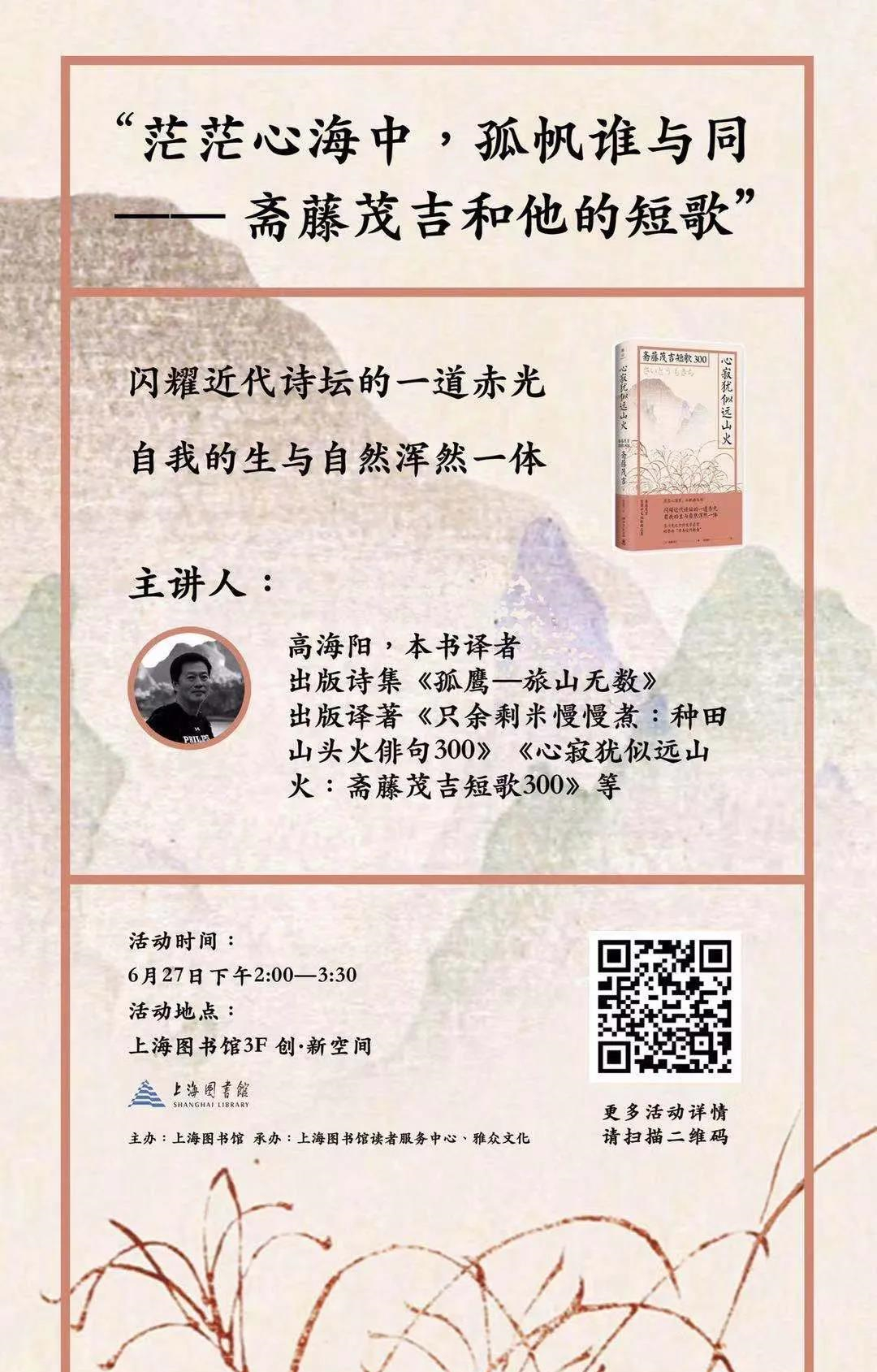
Shanghai | The vast sea in the heart, who is alone with the sail-Saito Maoji and his short songs
Time:June 27th (Sunday) 14:00-15:30
Location:Shanghai Library, No.1555 Huaihai Middle Road, Xuhui District, 3F creates a new space.
Speaker:Gao Haiyang (poet and translator)
"Short Song" began in the 6th and 7th centuries, and it is one of the many poetic styles of Japanese Wakayama. In modern times, many singers tried to innovate the traditional harmony songs. Shigeyoshi Saito is one of the leading figures in the modernization of short songs, and later has the reputation of "the sage of modern songs". On the afternoon of June 27th, Mr. Gao Haiyang, the translator of the first Chinese version of Shigeyoshi Saito’s short song anthology "My heart is still like a distant mountain fire: Shigeyoshi Saito’s short song 300", will be a guest at the sharing meeting of the above picture, reading the short song and haiku, the life of Shigeyoshi Saito, and his short songs full of emotion and tension, so as to lead readers to appreciate the red light shining in modern Japanese poetry circles.
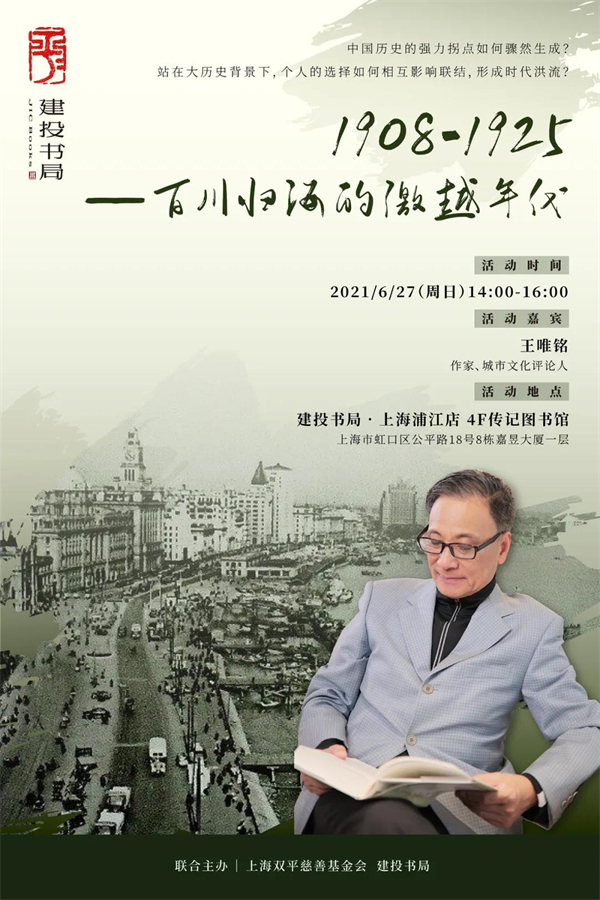
Shanghai | 1908-1925 —— The violent age when hundreds of rivers returned to the sea.
Time:June 27th (Sunday) 14:00-16:00
Location:4F Biography Library of Investment Press was built on the first floor of Jiayu Building, Building 8, No.18 Gongping Road, Hongkou District.
Speaker:Wang Weiming (writer, urban culture critic)
On the afternoon of June 27th, Jiantou Bookstore, together with Shanghai Shuangping Charity Foundation, invited Wang Weiming, a writer and critic of urban culture, to visit Jiantou Bookstore, Shanghai Pujiang Store, to unveil the historical features of the radical era from 1908 to 1925, to depict the figures in the background of the changing era, and to tell the evolution of ideological trend in the awakening era.
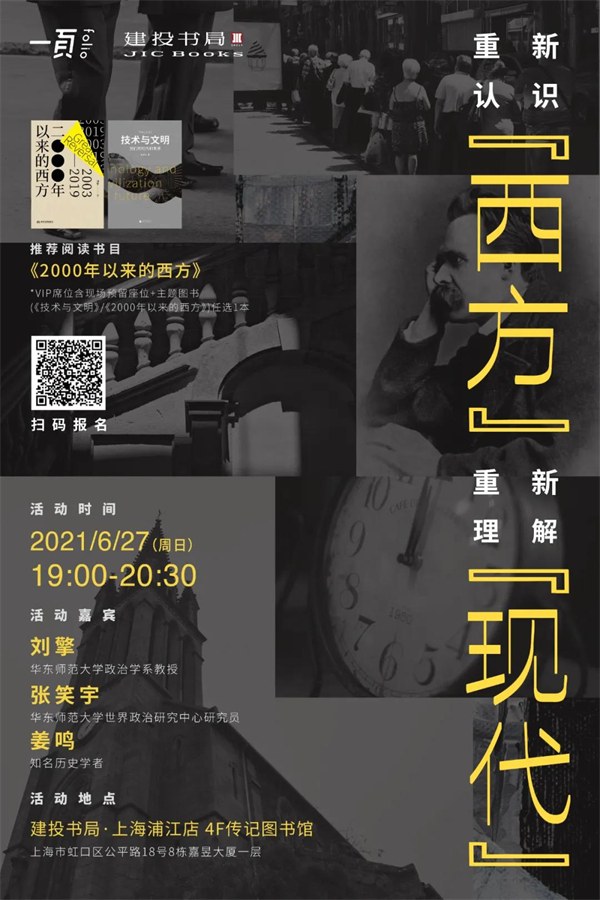
Shanghai | Re-understand "West" and "Modern"
Time:June 27th (Sunday) 19:00-20:30.
Location:4F Biography Library of Investment Press was built on the first floor of Jiayu Building, Building 8, No.18 Gongping Road, Hongkou District.
Guest:Liu Qing (Professor, Department of Political Science, East China Normal University), Zhang Xiaoyu (Researcher, Center for World Politics Studies, East China Normal University) and Ming Jiang (Historian).
How should we re-recognize and re-position the "West"? What happened in the west in the first 20 years of the 21st century, and what will happen in the future? This is discussed by Professor Liu Qing, a highly acclaimed tutor of Qipa Theory, in his new book "The West since 2000". Today in history, do we subconsciously think that the premise of "what is modern" is clear, the content already exists, and the benchmark has lived in reality? Zhang Xiaoyu, a young political scientist, put forward such a question in his new book Technology and Civilization: What exactly is a modern society? How did modern society come into being? Will different understandings of modern society tear the world apart? On June 27th, Jiantou Bookstore jointly invited Professor Liu Qing, the tutor of Qipa Shuo, Zhang Xiaoyu, a young political scientist, and Ming Jiang, a well-known historical scholar, to visit Jiantou Bookstore, Shanghai Pujiang Store, to share their observations on the West and their understanding of modern society over the years.
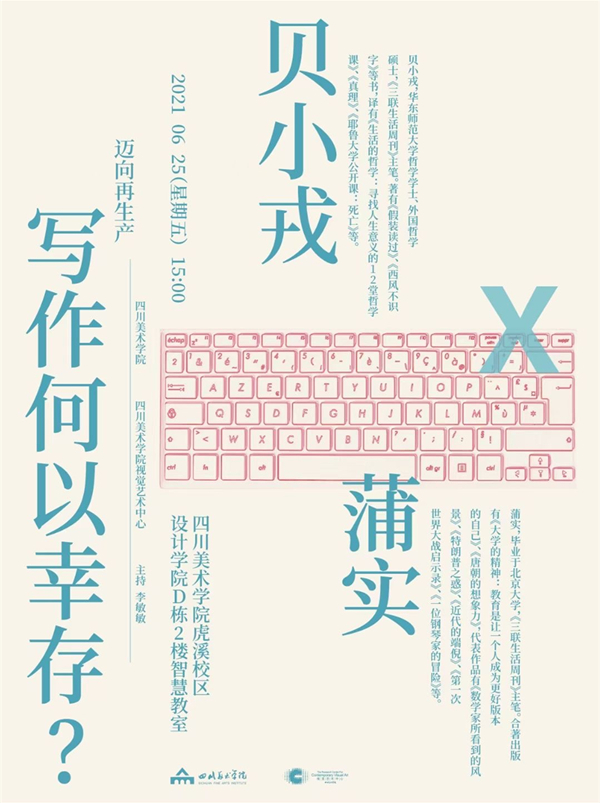
Chongqing | Towards Reproduction: Why Does Writing Survive?
Time:15:00 on Friday, June 25th.
Location:Wisdom Classroom, Floor 2, Building D, sichuan fine arts institute Design Institute, No.28 University Town South Road, Shapingba District
Guest:Bei Xiaorong (lead writer of Sanlian Life Weekly) and Pu Shi (lead writer of Sanlian Life Weekly)
Literature may belong to writers, but writing should belong to everyone. Today, new technology seems to bring diversified possibilities to writing. From blog to Weibo, online literature and artificial intelligence writing, writing has become more attractive. However, the technology and process of this production are still firmly controlled by the system, that is to say, under this more detailed control, writing (production) will inevitably lead to a boring. Why does writing survive? It seems to be urgent. Therefore, we look forward to becoming a real writer, to regain possession of these technologies and processes, and thus to reproduction.
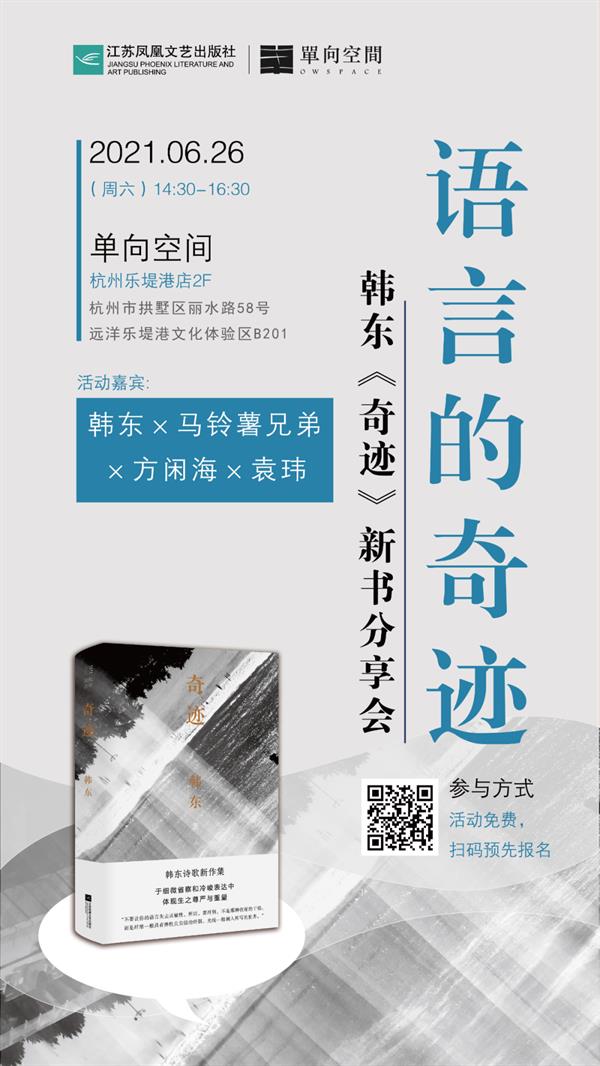
Hangzhou | The Miracle of Language —— A New Book Sharing Meeting of HanDong’s Miracle
Time:June 26th (Saturday) 14:30-16:30
Location:One-way space 2F, B201, Yuanyang Ledigang Cultural Experience Zone, No.58 Lishui Road, Gongshu District
Guest:HanDong (poet and novelist), Potato Brothers (poet), Fang Xianhai (poet and artist) and Yuan Wei (poet and artist).
What is the way of nature? What is the way of poetry? How to write "the artificial language of nature" On June 26th, HanDong will take the latest collection of poems "Miracle", which was launched after six years, and visit Hangzhou Ledigang Store with the poets Potato Brothers, Fang Xianhai and Yuan Wei to talk about the latest achievements of this poem creation and language exploration. Talk about the use of concrete, simple and clear words in poetry writing; Talk about the miracle of poetry created by language skills.
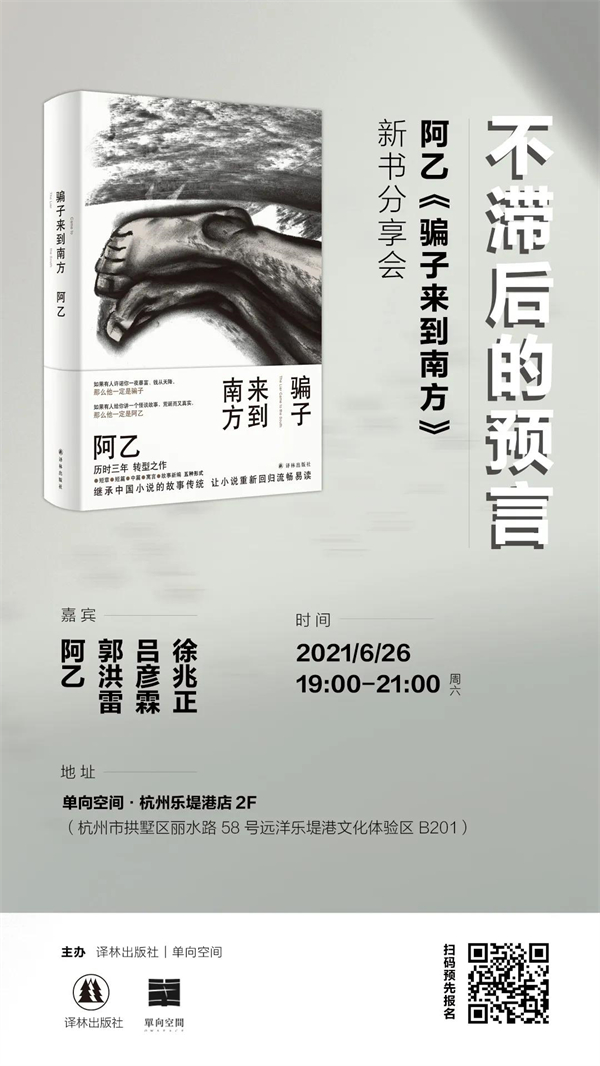
Hangzhou | Not Lagging Prophecy —— A B’s New Book Sharing Meeting of "The Liar Comes to the South"
Time:June 26th (Saturday) 19:00-21:00
Location:One-way space 2F, B201, Yuanyang Ledigang Cultural Experience Zone, No.58 Lishui Road, Gongshu District
Guest:A Yi (writer), Guo Honglei (professor and doctoral supervisor of School of Humanities, Hangzhou Normal University), Lv Yanlin (lecturer of School of Humanities, Hangzhou Normal University) and Xu Zhaozheng (doctor of Beijing Normal University).
In 2019, after writing the novella "The Liar Came to the South", A B defined it as: a lagging reflection of the social fact that the liar became a disaster. In 2021, A Yi found that fraud was still rampant, and the swindlers even had a great readiness to fight with us for a long time. This novel became a "not lagging prophecy". On the evening of June 26th, novelist A Yi took his new book "Liars Come to the South" as a guest in one-way space, and shared the contents of the new book and "not lagging behind" with scholars such as Guo Honglei, Lu Yanlin and Xu Zhaozheng.
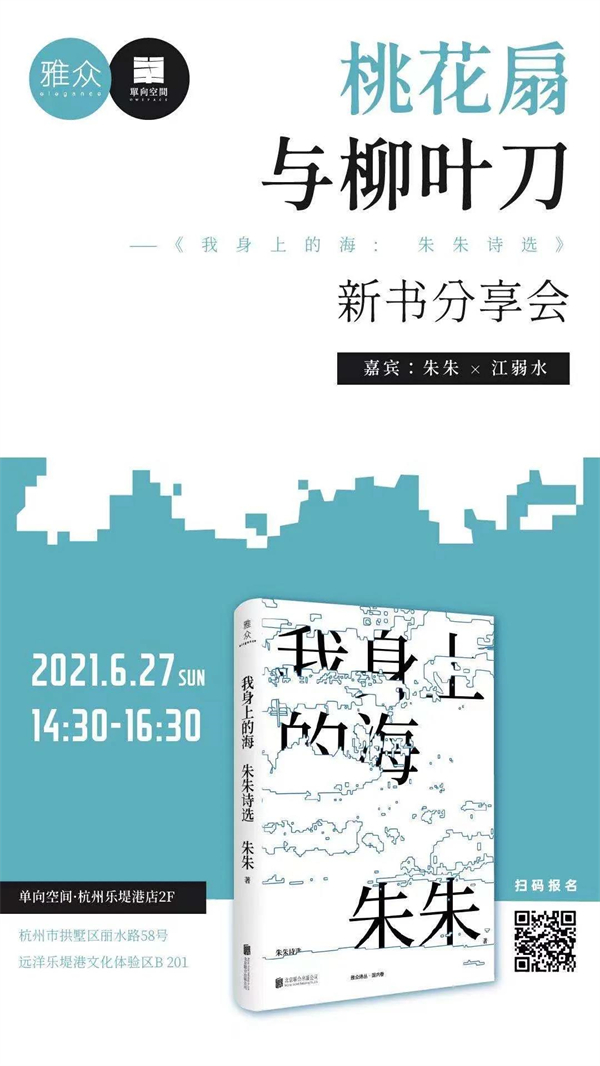
Hangzhou | Peach Blossom Fan and The Lancet —— A New Book Sharing Meeting of My Sea: Selected Poems of Zhu Zhu
Time:June 27th (Sunday) 14:30-16:30
Location:One-way Space B201, Yuanyang Ledigang Cultural Experience Zone, No.58 Lishui Road, Gongshu District
Guest:Zhu Zhu (poet) and Jiang Weak Water (poetry critic)
Zhu Zhu formed his elegant, subtle and restrained style in the 1990s. After entering the new century, his inner lyricism blended narrative, drama and other artistic elements. Through a series of more creative texts, he conveyed the depth of personal experience and the breadth of collective memory in the context of historical changes and contemporary life. In 2021, Yazhong Poetry Collection newly published the first anthology of Zhu Zhu’s 30-year writing-"My Sea: Selected Poems of Zhu Zhu". On the afternoon of June 27th, the poet Zhu Zhu and the poetry critic Jiang Ruanshui will visit the One-way Space Hangzhou Ledigang Store, and take this anthology of poems as the thread to lead everyone into Zhu Zhu’s poetry world.
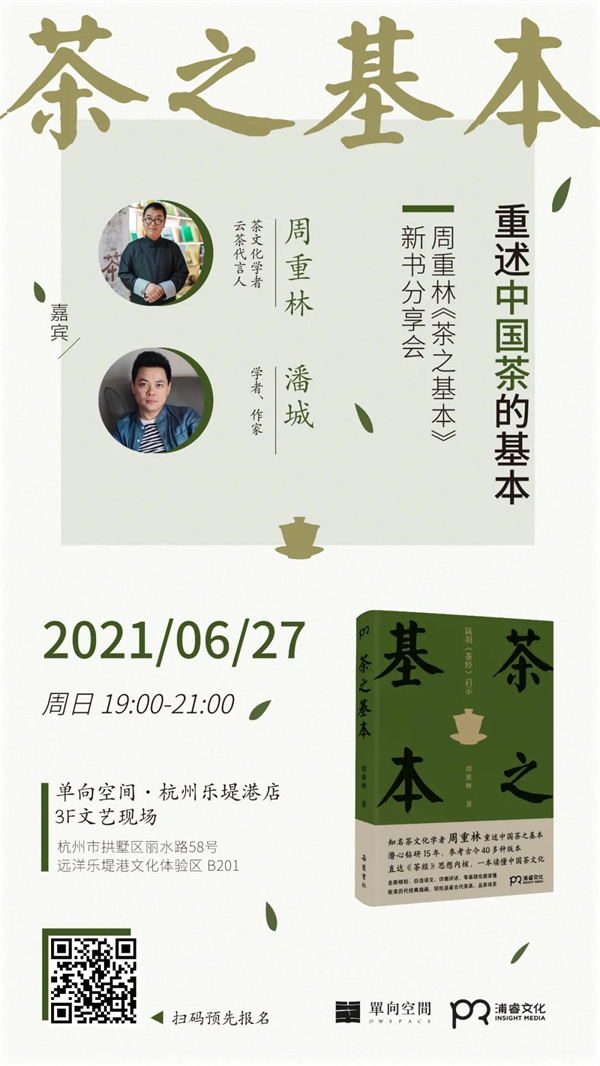
Hangzhou | Restatement of the Basics of China Tea —— A New Book Sharing Meeting of the Basics of Tea in Zhou Zhonglin
Time:June 27th (Sunday) 19:00-21:00.
Location:One-way space 3F, B201, Yuanyang Ledigang Cultural Experience Zone, No.58 Lishui Road, Gongshu District, literary scene
Guest:Zhou Zhonglin (tea culture scholar) and Pan Cheng (scholar and writer)
Lu Yu wrote Tea Classic in order to liberate tea from the secular way of eating, while Zhou Zhonglin wrote The Basics of Tea in order to regain the elegant tradition of tea in China and spread the tea culture in China. On the evening of June 27th, Zhou Zhonglin, a scholar of tea culture, and Pan Cheng, a scholar and writer, visited Hangzhou Ledigang Store, a one-way space, to talk about the enlightenment of Lu Yu’s Tea Classic and trace back to the source of tea culture in China.
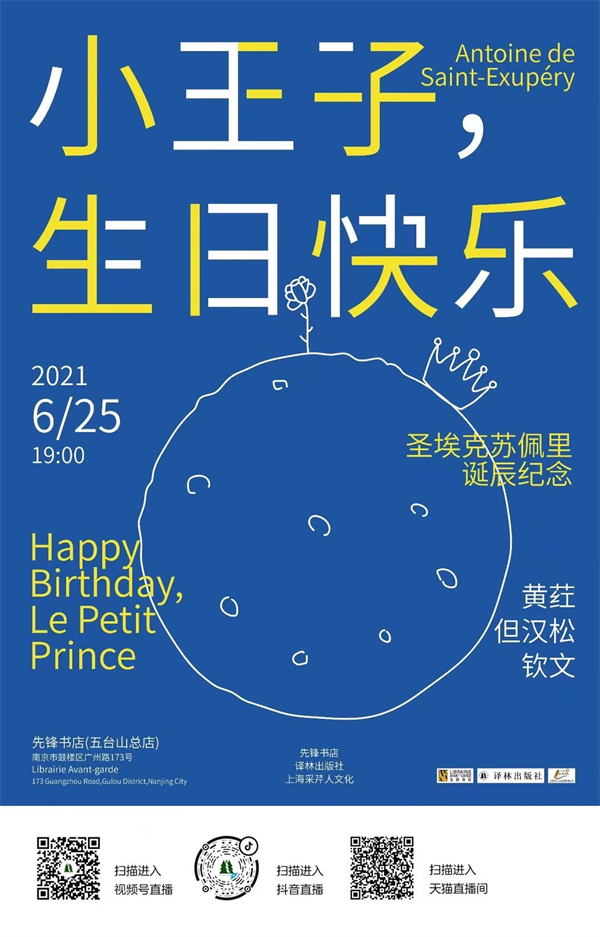
Nanjing | Happy birthday, little prince-Saint Exupery’s birthday commemoration
Time:19:00 on Friday, June 25th.
Location:Pioneer bookstore, No.173 Guangzhou Road, Gulou District
Guest:Huang Hong (Professor, Doctoral Supervisor, French Department, Nanjing University), Dan Hansong (Professor, English Department, Nanjing University), Qin Wen (Lecturer and Translator, School of Foreign Languages, Nanjing University)
June 29th is the birthday of Saint Exupé ry, a famous French writer. The Little Prince written by him has been translated into more than 300 languages and touched countless hearts. On the evening of June 25th, Huang Yong, a professor of French Department of Nanjing University, will visit pioneer bookstore with his translations The Little Prince and The Encyclopedia of the Little Prince, and The Stars and Roses of the Little Prince: A Biography of Saint Exupé ry by Schiff, a Pulitzer Prize winner, to review the romantic life of Saint Exupé ry and share the depth of his works.
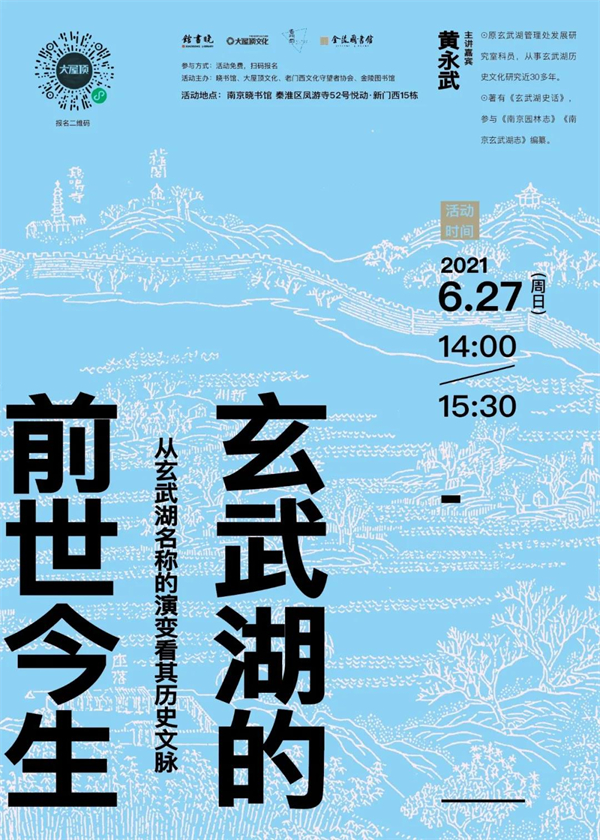
Nanjing | past lives of Xuanwu Lake —— Looking at the historical context of Xuanwu Lake from the evolution of its name
Time:June 27th (Sunday) 14:00-15:30
Location:Building 16, Yuedong Xinmenxi, No.52 Fengyou Temple, Qinhuai District, Xiaoshuguan
Speaker:Huang Yongwu (former member of the Development Research Office of Xuanwu Lake Management Office)
In the long history of nearly two thousand years, Xuanwu Lake has become a hotbed of culture and art, which has had a certain impact on the historical and cultural development of Nanjing. Many people of the hour have left immortal legends and poems for Xuanwu Lake. On June 27th, Big Roof Culture invited Huang Yongwu, a former member of the Development Research Office of Xuanwu Lake Management Office, to visit Nanjing Xiaoshu Library, and "look at the historical context of Xuanwu Lake from the evolution of its name" with readers on the theme of "past lives of Xuanwu Lake".
Nanjing | Meiyuan Classic Reading Group No.34: "Nine Kings Seize the Office"
Time:June 27th (Sunday) 15:00-17:30
Location:Wanxiang Bookstore, No.8 Jinyinjie, Gulou District
Speaker:Zheng Xiaoyou (Deputy Research Librarian of National Library), Li Xiaobo (Lecturer of History Department of Nanjing Normal University) and Xia Xia (History and Culture Lover).
"Nine Kings Seize the Office" is Dr. Zheng Xiaoyou’s third popular reading of political history in Qing Dynasty, which is a bridge between academic history research and public history reading. Behind it is the author’s desire to break the shackles of people’s procedural and facebook thinking when observing history, which is admirable. The thirty-fourth salon of Meiyuan Classic Reading Group will focus on this book by Zheng Xiaoyou.
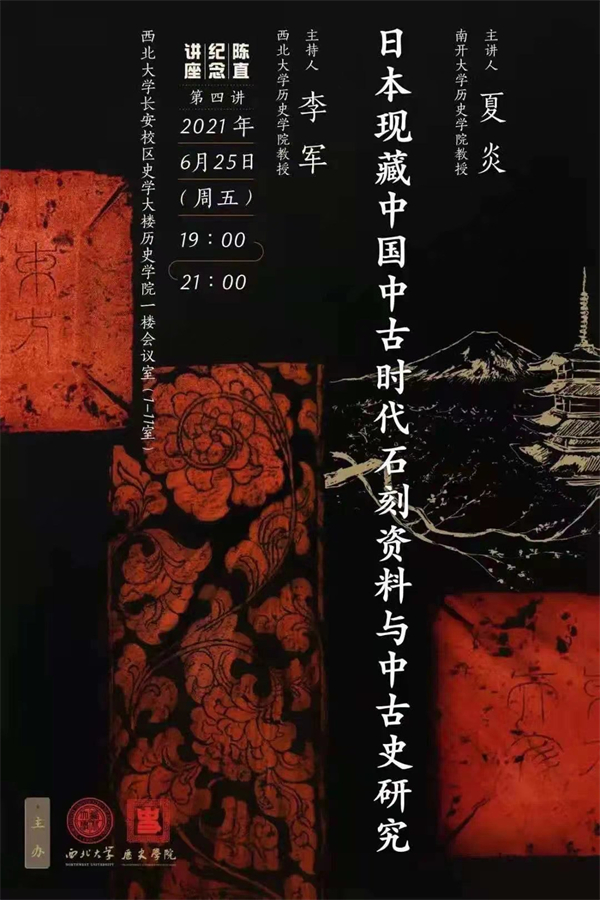
Xi ‘an | Research on Ancient Stone Inscriptions and Medieval History of China in Japanese Collection.
Time:June 25th (Friday) 19:00-21:00.
Location:Meeting room (Room 1-11) on the first floor of History College, History Building, Chang ‘an Campus, Northwest University, No.1 Xuefu Avenue, Chang ‘an District
Speaker:Xia Yan (Professor and Doctoral Supervisor, School of History, Nankai University)
Professor Xia Yan’s main research directions are social history, environmental history and institutional history of Wei, Jin, Southern and Northern Dynasties, Sui and Tang Dynasties. In the fourth lecture of "Chen Zhi Memorial Lecture", we invited Professor Xia Yan to give a lecture on the ancient stone carving materials in China and the study of medieval history.

Xi ‘an | Awakens the warm memory of food and local conditions.
Time:June 26th (Saturday) 15:00-17:00.
Location:SKP RENDEZ-VOUS, activity area, 9th floor, Xi ‘an SKP Shopping Center, No.261 Chang ‘an North Road, beilin district.
Guest:Zhu Xuedong (freelance writer and columnist) and Duan Wanjin (lawyer)
The taste of Jiangnan drifting away, the simple love and affection for food and dishes, the respect and admiration for nature in seasonal solar terms, and the feedback from nature to people’s tenacious will to survive continue from life to this book "People’s Diet". What’s your favorite food after climbing mountains and crossing the sea? What are your childhood memories? In the land of Guanzhong, where the wine is warm and the ears are hot, which store do you often drink and chat with your friends? On June 26th, Zhu Xuedong will take his new book "People’s Diet" to visit SKP RENDEZ-VOUS in Xi ‘an, and show us his food map, hometown food notes and private food list.
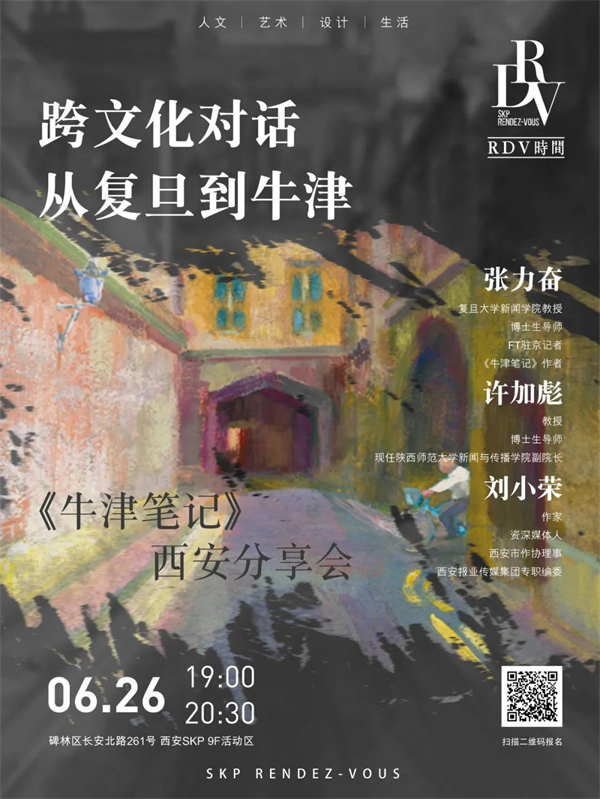
Xi ‘an | Cross-cultural Dialogue: From Fudan to Oxford —— Sharing Meeting of Oxford Notes in Xi ‘an
Time:June 26th (Saturday) 19:00-20:30
Location:SKP RENDEZ-VOUS, activity area, 9th floor, Xi ‘an SKP Shopping Center, No.261 Chang ‘an North Road, beilin district.
Guest:Zhang Lifen (Professor and Doctoral Supervisor of School of Journalism, Fudan University), Xu Jiabiao (Vice President, Professor and Doctoral Supervisor of School of Journalism and Communication, Shaanxi Normal University), Liu Xiaorong (writer and media person).
Different from other notebook works, Zhang Lifen’s Oxford Notes has brought us a long-lost stranger experience. His language is like floating ice in the sea of Wang Yang, which is fragmented, warm and eloquent at the same time. By reading his words, we can feel his lovely soul and broad vision. On June 26th, Zhang Lifen, the author of the new book "Oxford Notes", talked with guests Xu Jiabiao and Liu Xiaorong about Britain and Oxford that you didn’t know, and shared the story behind the creation with readers.
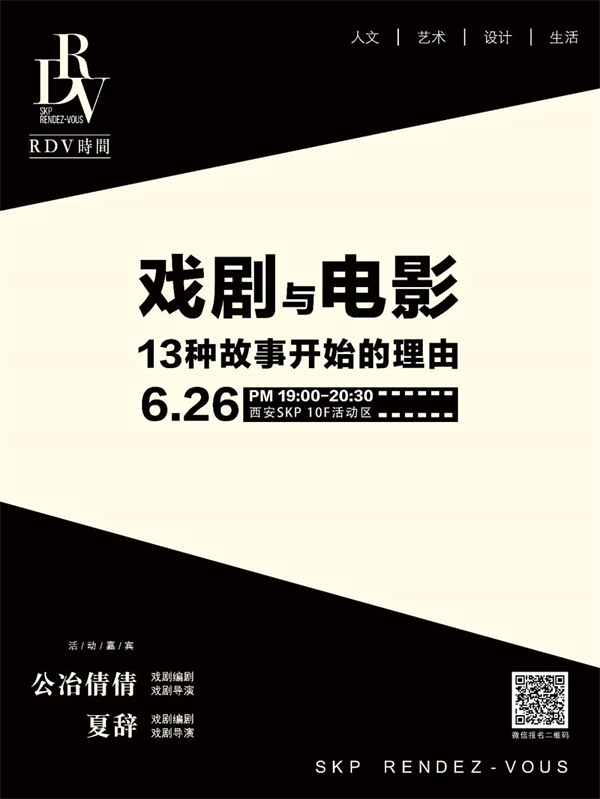
Xi ‘an | Drama and Movies —— Reasons for the Beginning of 13 Stories
Time:June 26th (Saturday) 19:00-20:30
Location:SKP RENDEZ-VOUS, activity area, 10th floor, Xi ‘an SKP Shopping Center, No.261 Chang ‘an North Road, beilin district.
Guest:Gong Yeqian (screenwriter and director) and Xia Ci (screenwriter and director)
On June 26th, we invited playwright and drama director Gong Yeqian and Xia Ci. They will compare and analyze the opening ways of quentin tarantino’s works and many other drama works, a legend in film history, so as to let everyone participate in it and feel the corresponding embodiment of the opening ways of the film in the drama on the basis of demonstrating examples.
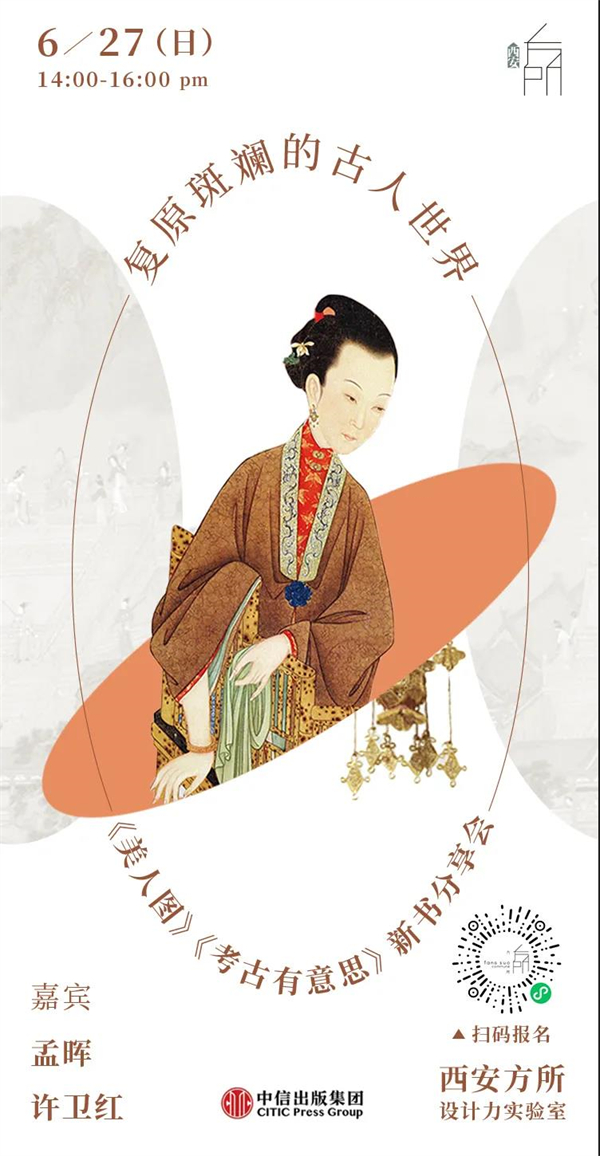
Xi ‘an | Restoring the Gorgeous World of the Ancient People —— Sharing Meeting of New Books of Beauty Map and Interesting Archaeology
Time:June 27th (Sunday) 14:00-16:00
Location:Fang Fangli Laboratory, Floor 1, Laochenggen Gpark Shopping Center, No.22 Xinghuo Road, Lianhu District
Guest:Meng Hui (researcher and writer of China traditional material culture) and Xu Weihong (researcher and writer of Shaanxi Archaeological Research Institute).
This Sunday, Meng Hui, a researcher and writer of China’s traditional material culture, will come to Xi ‘an Fangfang Bookstore with her new work "The Picture of Beauty" to understand the ancients’ pursuit of beauty from the details of ancient daily life and arouse readers’ re-imagination of classical beauty.
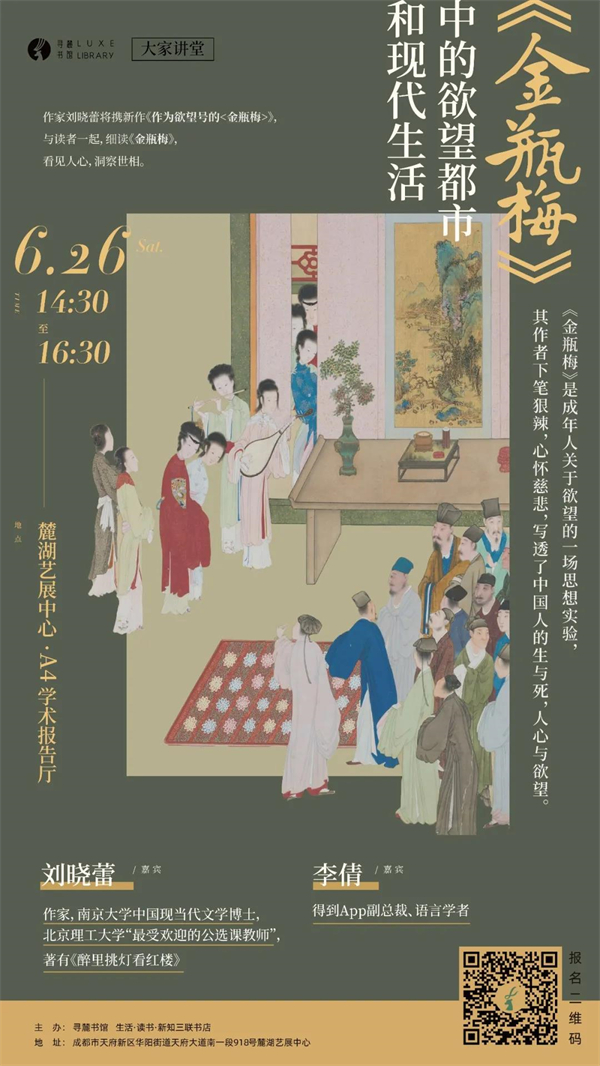
Chengdu | Sex and the City and Modern Life in Jin Ping Mei
Time:June 26th (Saturday) 14:30-16:30
Location:No.918, South Section 1 of Tianfu Avenue, Tianfu New District Luhu Art Exhibition Center A4 Academic Lecture Hall
Guest:Liu Xiaolei (writer) and Li Qian (vice president of App, linguist)
On June 26th, Liu Xiaolei, a writer, will take her new work "Jin Ping Mei as Desire" as a guest, and together with Li Qian, a vice president and linguist, will show you this great book of life and death of mortals. Welcome readers to read Jin Ping Mei carefully with Liu Xiaolei, see people’s hearts and gain insight into the world; Think about life and death, stay away from fear, let go of arrogance and prejudice, and gain the ability to love.
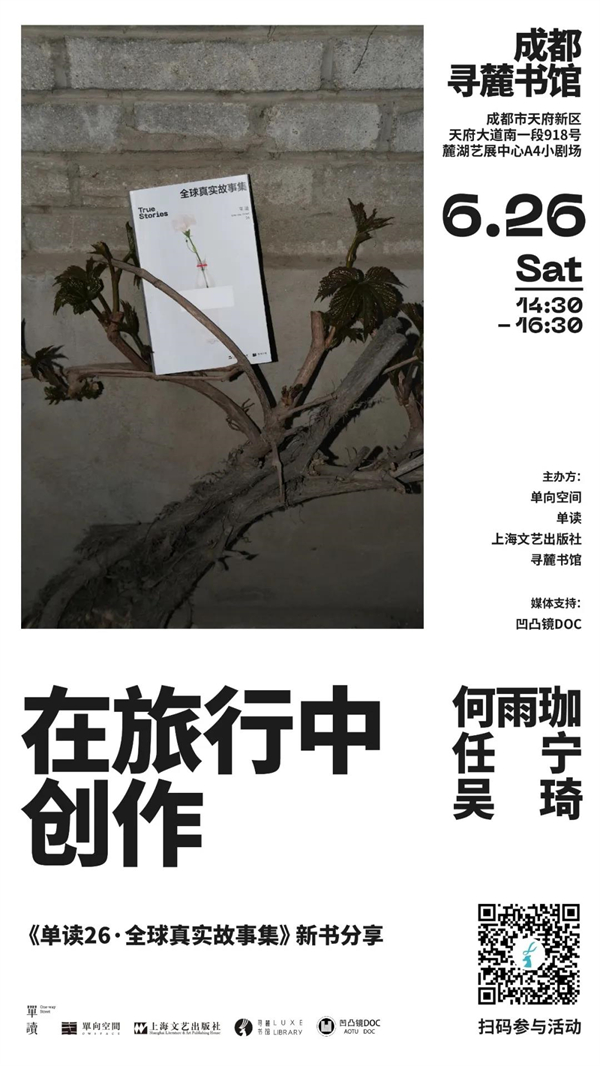
Chengdu | Creating in Travel —— Sharing the New Books of Single Reading 26 Global True Stories Collection
Time:June 26th (Saturday) 14:30-16:30
Location:No.918, South Section of Tianfu Avenue, Tianfu New District Luhu Art Exhibition Center A4 Small Theater
Guest:He Yujia (translator), Ren Ning (founder of venture capital fund) and Wu Qi (editor-in-chief of Single Reading)
Finding the topic during the trip is the favorite way of Single Reading. "Single Reading 26 Global True Stories Collection" can be said to be born by a trip. Today’s three guests are not only lovers of travel, but also beneficiaries of travel. So, is it possible to create while traveling? What kind of influence did travel bring to them? Under the epidemic, how did they change the direction of travel and what new discoveries did they make? On the afternoon of June 26th, let’s talk about travel and creation together.
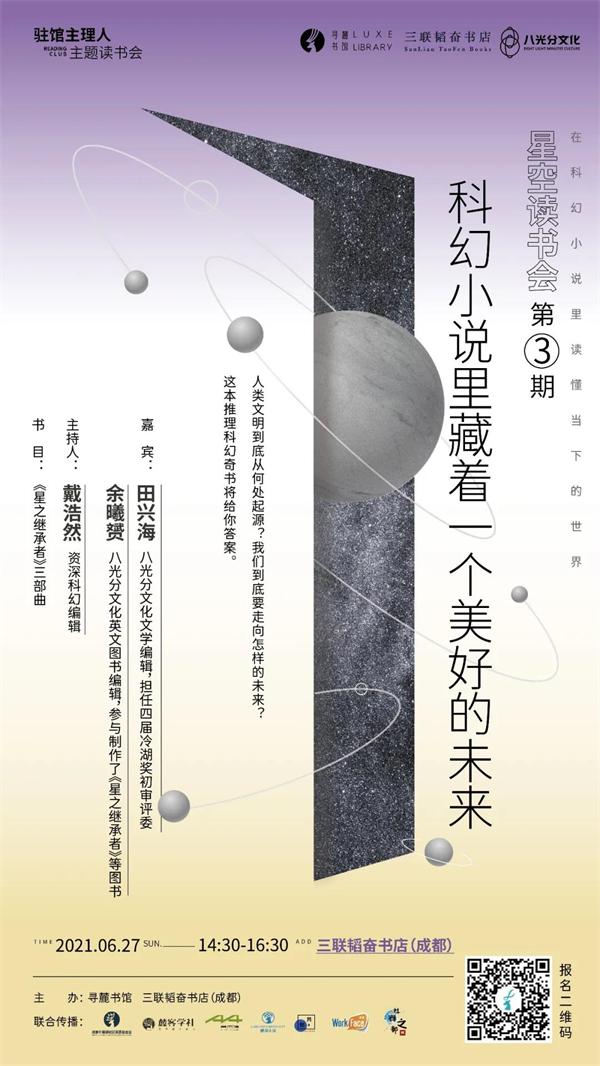
Chengdu | There is a bright future hidden in science fiction.
Time:June 27th (Sunday) 14:30-16:30
Location:Qingyang District Kuanzhai Lane No.30 Sanlian Taofen Bookstore
Guest:Yu Xiyun (editor of cultural English book in Baguangfen) and Tian Xinghai (editor of cultural literature in Baguangfen and author of science fiction)
On June 27th, Dai Haoran, a senior sci-fi editor, will invite Tian Xinghai and Yu Xiyun, editors of "The Inheritor of the Stars", to reveal the origin of human civilization for you. What kind of future are we going to? We are still willing to believe that life will always find a way out! The driving force that drove the fish to climb ashore hundreds of millions of years ago pushed us to struggle for a lifetime! No matter where humans come from, these billions of stars have been handed over to us to inherit!
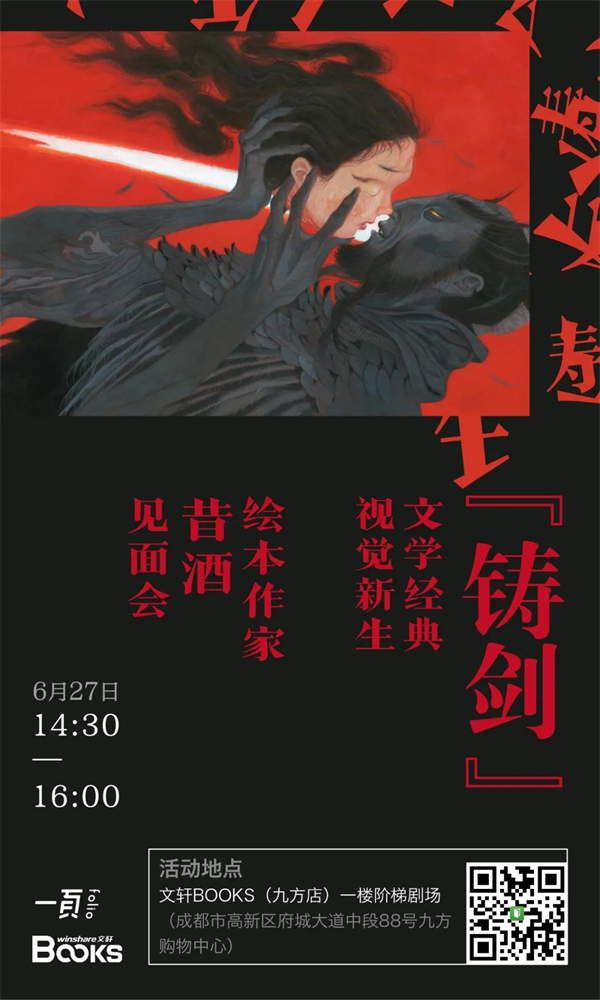
Chengdu | "Casting Sword": A Visual Freshman of Literary Classics —— A Meeting of Picture Book Writers with Yesterday’s Wine
Time:14:30 on Sunday, June 27th.
Location:Step activity area on the first floor of Wenxuan BOOKS, Jiufang Shopping Center, No.88 Middle Section of Fucheng Avenue, High-tech Zone
Speaker:Xijiu (picture book writer)
On June 27th, the first meeting of Casting Sword was held. We invited the picture book writer-Xijiu, who took us back to Lu Xun’s classic stories with her colorful brushstrokes, to visit Wenxuan BOOKS Jiufang Store and share the mystery and novelty behind the image creation with us.
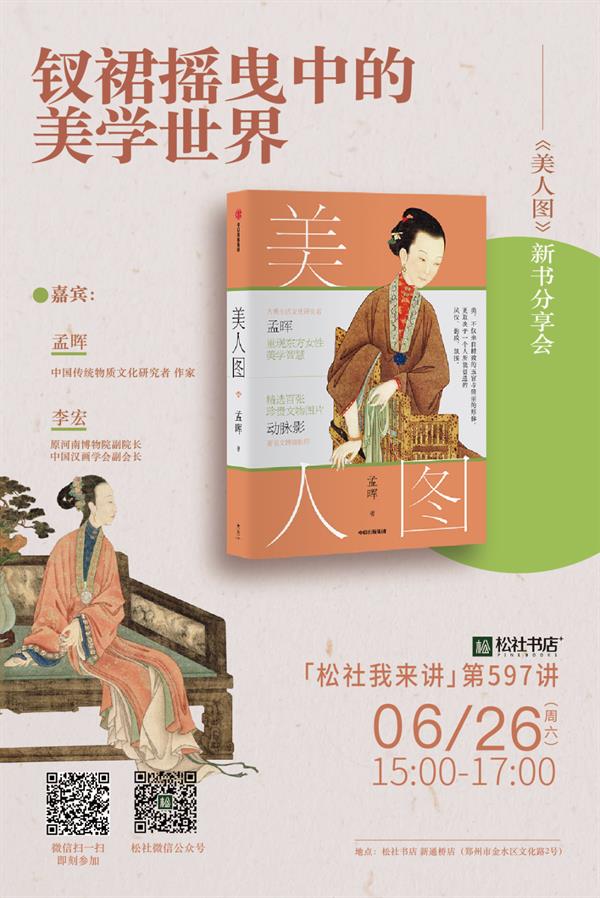
Zhengzhou | The Aesthetic World in the Shaking of Chai Skirt —— Sharing Meeting of the New Book of Beauty Map
Time:June 26th (Saturday) 15:00-17:00.
Location:Jinshui District Wenhua Road No.2 Songshe Bookstore
Guest:Meng Hui (researcher and writer of traditional material culture in China) and Li Hong (vice president of Chinese Han Painting Society)
Meng Hui’s latest work, Beauty Map, not only focuses on the clothes of ancient people, but also reveals how ancient women used aesthetic wisdom to all levels of food, clothing, housing and transportation. This Saturday afternoon, she will be a guest at Songshe Bookstore, and together with teacher Li Hong, she will explain "the aesthetic world of hairpin skirt swaying".
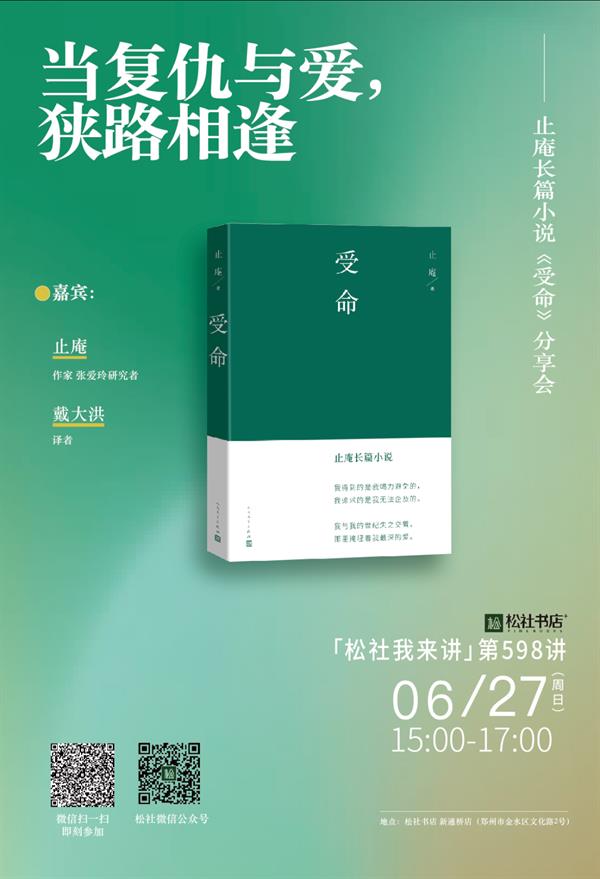
Zhengzhou | When Revenge and Love Meet in a Narrow Way —— Sharing Meeting of Zhi ‘an’s Novel "Being Ordered"
Time:June 27th (Sunday) 15:00-17:00
Location:Jinshui District Wenhua Road No.2 Songshe Bookstore
Guest:Zhi ‘an (writer and scholar) and Dai Dahong (translator)
Being ordered is the first novel of Zhian, which is about memory and love. Memory comes from the past and has not yet left. Love points to new life, but it cannot grow. On Sunday afternoon, writer, Zhang Ailing researcher Zhi ‘an and translator Dai Dahong will visit Songshe Bookstore to share the revenge and love in The Order with readers.
360: "360 safety big model" provides users who buy 360 standard products with the standard capacity of big model free of charge, realizing the generalization of big model and the transformation of new
() Financial Research Center on December 10th, some investors asked () what is the future development prospect?
The company replied that hello, dear investors, the company continued to focus on the two main lines of "AI and safety" and maintained high R&D investment. The company focuses on the frontier technology of large models and AI security issues to ensure that the development of domestic large models is "autonomous and controllable"; At the same time, it deeply combines the company’s security and AI capabilities, defends the national network security with the "China Program" of digital security, and is the guardian of a network power.
In the field of artificial intelligence: This year, the company has successively released three AI native products, namely "Nano Search (original 360AI Search)", "360AI Browser" and "360AI Office", and continued to iteratively upgrade the products, and the user experience and user stickiness continued to grow at a high speed. For government and enterprise customers, the company released an enterprise-level AI big model solution, followed the four principles of "safety, goodness, credibility and controllability", and created an enterprise-level vertical big model to help the digital transformation and intelligent upgrading of the industry. Up to now, 360 Zhinao has taken the lead in providing large-scale enterprise-level solutions for 20 core industries such as government, finance, taxation, medical care, manufacturing, and cultural tourism to create new quality productivity.
Digital security field: Promote the reform of the security industry with the concept of "security-as-a-service", help the digital transformation of countries, cities, industries, enterprises and institutions, and escort the construction of a network power and digital China. At the same time, the company combines the big model with safety, integrates the big model technology, methodology, network-wide data and expert knowledge, and publishes the first free big model of safety in the industry-"360 big model of safety", which provides users who buy 360 standard products with the standard capacity of big model for free, and realizes the generalization of big model and the new quality productivity reform in the safety industry.
The company will continue to improve quality and efficiency through the above business measures to enhance market confidence. Thank you for your attention.
Now reading: How to wake up Xiao Ai on Xiaomi mobile phone, how to wake up Xiao Ai on Xiaomi mobile phone [Detailed explanation] How to wake up Xiao Ai on Xiaomi mobile phone, how to wake up Xiao Ai o
How can Xiaomi mobile phone wake up Xiao Ai?
Method one:
Select the Xiao Ai Classmate app on your Xiaomi phone and click Open Xiao Ai Classmate.
Method two:
Keyword Spotting Calling Xiao Ai Classmate can wake up Xiao Ai Classmate.
Method three:
Press and hold the power button of the Xiaomi phone for about 0.5 seconds to wake up Xiao Ai. This method requires the function to be turned on in Xiao Ai’s settings.
Method 4:
Long press the HOME button of the Xiaomi mobile phone to wake up Xiao Ai. If there is no physical home button, it can be achieved through the virtual home button.
Method 5:
Some Xiaomi mobile phones have added an AI button on the side, and Xiao Ai can be quickly awakened by pressing the AI button.
The 24th Chengdu International Auto Show was grandly opened this Sunday.
On August 29th, 2021, the 24th Chengdu International Auto Show will be grandly opened in Rongcheng. The theme of this year’s auto show is "the tide is moving, Rongcheng is driving brilliantly". On the basis of last year, there is a new exhibition hall with a scale of 200,000 square meters. The next 10 days will be the highlight time for the world’s highest-selling A-class auto show to show its huge energy consumption.
Chengdu International Auto Show, which has been held for 23 consecutive years, has formed a tripartite confrontation with Guangzhou International Auto Show and Beijing and Shanghai International Auto Show held alternately every other year, and has become a battleground for major auto manufacturers to seize the western region, especially the Chengdu market. This year’s Chengdu International Auto Show attracted German, American and Japanese car companies as well as independent car companies such as Great Wall, Geely and BYD, and more than 130 well-known brands at home and abroad participated. At the same time, many new energy automobile brands, such as Weilai, Tucki, Lantu and Tianji, will also show the latest achievements to consumers here. More than 1,500 new cars were airborne in Xibo City, and 60 conferences were held, revealing dozens of world-first or domestic first-time models, bringing a car feast to Rongcheng consumers. BMW, Audi, Mercedes-Benz, Jaguar Land Rover, Volvo, Lectra, Changan Ford, Geely, BYD and other participating brands all brought the latest models here. The brand-new mercedes benz c class, brand-new Audi Q2L and BYD Ocean Series all met the public at the auto show for the first time.
In January last year, the Central Financial and Economic Committee proposed to promote the construction of the twin-city economic circle in Chengdu-Chongqing area. The twin-city economic circle in Chengdu-Chongqing region is an economic circle integrated by Chengdu metropolitan circle, Chongqing metropolitan circle and the axis belt affected by the new polarization and strong radiation of the "twin cities". Chengdu will usher in brand-new development opportunities, and the regional advantages of leading engines will be more obvious. Today, Chengdu has a permanent population of 20.938 million, making it the fourth national central city with a permanent population of over 20 million. Pushing the window to see snow and pushing the door to see green, "Park Chengdu" is also the most livable city in China, and cars have become an important carrier to push up the happiness index of citizens.
At the same time, Chengdu has a high economic activity and strong purchasing power, and the global mainstream automobile brands are selling well here. The huge market with a population of 20 million and unlimited car purchases is extremely rare in the world. Therefore, Chengdu International Auto Show has become the world’s highest-selling A-class auto show event and the weather vane of Chengdu-Chongqing area and even China auto market.
As an important pole of China automobile market, Chengdu automobile market has developed rapidly in recent years. According to the data released by the Traffic Management Bureau of the Ministry of Public Security, the number of cars in Chengdu has exceeded 5 million, which is the second automobile city in China after Beijing. First-tier cities with earlier economic development, such as Beijing, Shanghai and Guangzhou, have already restricted the number of cars. Chengdu, the most dynamic city in China, is a hot spot of China automobile market and has become a new engine to promote the development of automobile industry in Chengdu and Chongqing.
At the 24th Chengdu International Auto Show in 2021, Chengdu Daily and Jinguan News New Media Cluster will create a series of special issues to interpret the happy life of 20 million citizens in Chengdu. At that time, a series of special reports on the auto show will be launched, and after the auto show, the "Hot Car List of Chengdu’s Good Life" will be released to cheer for those models that have gained a lot at the Chengdu Auto Show.
Colorful Chengdu auto show traffic exhibition strategy should have been known.
The venue of the 24th Chengdu International Auto Show-China West Expo City is a famous Expo hall and the permanent venue of China West International Expo. Xibocheng is located at the southern foot of Tianfu New District, with mature backbone road networks such as Tianfu Avenue, Zizhou Avenue and Metro Line 1. Due to the huge area of the exhibition hall, it is easy for first-time consumers to get lost and waste a lot of physical strength by walking to the exhibition hall from parking lots, subway stations and bus stops, as well as wandering between the exhibition halls. To this end, this newspaper has specially compiled a practical traffic guide for exhibition viewing.
Self – driving
Navigation "China West Expo City", there are more parking spaces in the southeast ground parking lot of Xibo City and the nearby temporary parking area. There are parking lots at the nearest exits of several main roads, and the number of parking spaces has increased significantly compared with previous years. At the same time, the traffic control department will reduce the traffic control distance. When the parking spaces in the exhibition hall tend to be saturated, the distance to the exhibition hall after parking in the periphery will be greatly shortened. Only licensed vehicles, buses, taxis and special vehicles are allowed on the roads near other directions of Xibo City. Please plan the route in advance when driving to the exhibition.
taxi
It is most convenient for the audience who arrive by taxi to get off near Gate 16 of Xibo City in the east section of Fuzhou Road.
bus
In order to support the Chengdu International Auto Show, Chengdu Public Transport Group will make adjustments. The departure density of G90 and 236 buses will be increased, and 18-meter-long large-capacity buses will be used to meet the demand during peak hours. Bus lines passing through Xibo City will also increase the departure density. T1 and T6 buses go directly to the exhibition hall, where T1 bus gets off at Tianfu New District Customs Station and T6 bus gets off at West Expo City West Station.
subway
Subway is the preferred means of transportation for most citizens. It is very convenient to take subway trains on Line 1, Line 6 and Line 18, get off at Xibocheng Station (exit D) and go out to the ticket entrance of the exhibition hall.
Off-site free shuttle bus
Running route: Gate 1 of Xibocheng-Guangzhou Road Station of Metro Line 1-South Square Parking Area-Southeast Square Parking Area-at the intersection of Guangzhou Road and Zizhou Avenue (one-way circulation).
Car ferry in the infield of the exhibition hall
Upon arrival at the venue, there is also a free infield car ferry for use. The running route is: Hall 1-Hall 5-Hall 16, with uninterrupted circulation. The boarding places are located outside Hall 1, Hall 3, Hall 5, Hall 11, Hall 14 and Hall 16, which is convenient for getting on and off. (Reporter Tang Ai)